#Hélène Gore
Explore tagged Tumblr posts
Text

Friendis :3 They haven't seen each other in years and NEED to gossip. And they have sound based stands
[Merlot on the left by @corpsoir , Hélène Gore on the right by MEEE]
#this was so fun to do#simpler coloring style :3#rhaa ocs#Merlot Pavone#jjba oc#Hélène Gore#<- thats her tag now since her full name is longg#post punk revival#friend stuff#hi corppp#rhaa art
46 notes
·
View notes
Text
we love only the person we can eat
Relationship: Strade/Reader Rating: Explicit Contains: Gender-Neutral Pronouns, Vaginal Sex, Canon-Typical Violence, Blood and Gore, Cannibalism, Amputation, Love Confessions Length: 4600+ words:
Summary: “For us, eating and being eaten belong to the terrible secret of love. We love only the person we can eat [...] Eat me up, my love, or else I’m going to eat you up.”
Hélène Cixous (1998) Stigmata: Escaping Texts. pg. 78.
AO3 Link: https://archiveofourown.org/works/48093946
Loving someone shouldn’t feel like this, you think.
It should make you feel warm and fuzzy inside, it should feel like butterflies fluttering in your tummy, it should feel like safety, security, warmth and worship. It should be a feeling of girlish innocence and infatuation, bunny rabbits and taking the first steps past the gates of Disney World.
It shouldn’t feel like a virus or a disease that made your insides turn into poisonous mush and bile and spit, and threaten to spill out of you in a puddle of toxic vomit every time you opened your mouth.
It shouldn’t feel like your stomach and your brain were itching with insects and creepy-crawlies, maggots and worms, turning and squirming in your guts and never letting you feel a moment of stillness.
It shouldn’t feel like a life-encompassing obsession that convinced you that he would stop caring about you or even stop existing altogether if you stopped looking at him, stopped talking about him, stopped thinking about him, for even a second.
It shouldn’t feel like this.
But then again, you’re not sure if you even really felt love before this, before he saw you at the bar and took you for his own.
So maybe, this was exactly how love was supposed to feel.
“Ah…there you are. You’re waking up.”
It wasn’t often that you let yourself be underneath him, let yourself be taken so willingly, bare skin against skin. It wasn’t often that you allowed such a deliberate invasion of your space or exposure of your innermost vulnerabilities.
Not like you had much of a choice.
That night, you felt sluggish and slow and heavy, like you had a ton of weight strapped around your neck that kept your hazy eyes locked towards the ceiling, your neck pinned down to the bed. The pain you traditionally associated with being awake and living was replaced by an overwhelming numbness, so much so that it made your body feel cold and still, like a living corpse.
You assumed that your sluggishness was probably due to the drugs in your system. Strade was always pretty sloppy when it came to chemicals.
Not that you could blame him, though. He was more of a hands-on kind of guy, after all.
"Hey, buddy," He said with a slight tilt of his head, a playful lilt to his voice as he peered down, a slow smile spreading on his face as he considered you with a hungry twinkle in his golden eyes. "You doing okay? You were out of it for a while."
"Ngh," You attempted to speak, to make some kind of vocalisation (in either agreement or disagreement, you weren’t quite sure), but your tongue felt as heavy as your head did, loose and lousy behind your teeth, inside your skull.
He chuckled affectionately as he knelt up on the bed, the mattress dipping low underneath his weight (he had packed it on in the last couple of years since things had slowed down on his end of running the streams), pushing a hand through your hair. He wasn't gripping it just yet, he wasn't hurting you (a surprise in its own right), as he gently urged your head forward, your neck straight, and your eyes to meet his.
"Ah, I think I gave you too much sedative." He mused thoughtfully, raising his other hand to gently caress your cheek, his thumb tracing over your parted lips where a thin stream of drool was running down your chin, down your neck. "Whoops. My bad, I guess." He then said with a laugh. “You know me. I’m lousy with anything stronger than chloroform.”
In a moment of uncharacteristic gentleness (maybe he was in an especially good mood tonight), Strade started to kiss your cheek, down your neck, across your collarbone, practically doting on you and making your slack body tremble and shiver.
"I mean, I didn't have to sedate you," He then said with a casual shrug, giving your cheek (a smear of wet still clinging to your skin from his kiss) a few light taps, as if he was trying to wake you up from a deep slumber, wake you from your sluggish fatigue. "That was just me being nice, really. So I think a thank you is well deserved…”
He then brought his face closer to yours for a moment, raising a single brow with a silent question. A quiet reminder of just how dangerous he was capable of being, if he wanted to be.
“Don’t you?” He then said, his voice low.
“Mm,” You hummed, giving your head a little shake as you tried to kick yourself out of your sluggish daze and be as lively as he wanted you to be (and you were getting so tired of being lively). “T…thank you…”
“You’re welcome.”
His smile lines were deeper than they once were, and the corners of his eyes wrinkled and softened handsomely as he smiled, in a way they didn’t when you first met.
He was aging gracefully, he didn’t even have a single grey hair yet, and he had given you the privilege of aging alongside him. You could only guess the number of people who hadn’t been given such a privilege.
“Why did you sedate me?” You then asked, though your words were more of a mumble than anything else, your tongue still heavy behind your teeth.
"Oh, I wanted to do something special.” He replied, his voice a touch softer than usual as his smile softened too. “It’s our big day, after all.” He traced a thick finger along the curve of your jaw, down your neck, tracing the line that he had previously kissed. “I mean, it's kind of like an anniversary, don't you think, fräulein ? Seven years is an awfully long time for two people to be together. We ought to celebrate it."
Together.
He said the word so easily.
He implied a togetherness, a quasi-relationship that wasn’t built off a sadomasochistic need for fear and pain that was so terrifying and obscure and truly sublime in the most Gothic sense of the word, with such conviction that you were almost certain that he was joking, that he was teasing you.
And you were so easy to tease. You and your wide-eyed hopes, your romantic dreams, your tragically romantic books that depicted darkness and lightness in tandem, your cheesy romcoms that he bought for you and made fun of.
Together.
Were you?
He took a quiet moment to consider you further, his fingertips brushing tenderly over every scar that marred your shoulders, your chest, your barely exposed sternum, every cut, scrape or bruise, with such care and compassion despite him being the cause of the majority of them.
“I think we’re worth celebrating,” He brought his face close to yours, pressing a quick kiss to the corner of your mouth as his big hands mapped the span of your body as if he was trying to devote it to his memory, like he was afraid of possibly losing it. “ You’re worth celebrating.”
Really, when he spoke like that and touched you with a gentleness he never showed to anyone else ( because you’re special, you’re special, you’re special, that’s why he kept you, that’s why you were still alive ) , it's no wonder that you were keening up against him (the best you could), chasing his mouth with your own, wanting to be so close to him that your bodies merged together.
Loving someone shouldn’t feel like this, you think.
But you don’t want any other kind of love anymore.
Finally, he brought his mouth to yours in a deep kiss, one strong hand cupping your cheek, his grubby nails digging into the soft flesh as the other reached down and dug into your hip, groping and squeezing. When you gasped against his lips, he took the opportunity to press his tongue into your mouth, suffocating and all-consuming, and your eyes rolled back into your skull as you let yourself be so thoroughly invaded.
If it were possible for him to consume you, wholly, you would have let him, you think.
You knew that impulse came from something fucked up and Freudian, a wanting to be consumed by a man you should have hated but loved so deeply and intimately that it made you want to throw up, but that didn’t stop you from yearning for it.
You yearned for Strade to devour you with his sharp cannibal teeth , to tear flesh and muscle, to rupture skin and fat, and be devoured himself, in the truest sense of the word, in the unity of shared skin, bones, body, and blood.
But, because he couldn’t devour you (not in the literal, all-consumptive sense, at least), you, instead, pulled away from the kiss, raised your head, and bit his collar-bone to fill that violent yearning that haunted every dream and waking nightmare, marring his skin with rough indentations and pinpricks of blood welling at the surface of his tan skin.
Strade didn't mind.
“Ngh, scheiße !” He sucked in a pained hiss through his teeth, though that didn’t stop a dangerous grin from coming to his face as you dug your teeth in even deeper. “Ah…ahhh, little devil, this is how you want to play, ja?”
If anything, the pain made him all the more excited as he growled out his arousal and pressed himself even closer to you with another firm and invasive kiss, his cock hard through his slacks and rubbing against the soft mound of your cunt through your shorts, open and weeping and already begging to be stuffed to the very brim with his cock.
Gasping your own arousal against the deep kiss, your thighs parted with an unspoken invitation as you reached up (with shaking hands, the sedative hadn’t worn off just yet) to yank his shirt open, popped buttons shooting aside, and push it down his shoulders and his arms.
Despite the weight gain, and his general lack of strenuous activity as he had gotten older, Strade’s arms were still strong and well-defined (the strength gained from years of lugging around dead bodies didn’t go away that quickly, it seemed). You allowed yourself an ever-indulgent moment to stroke up and down them, feeling the warmth of his tan skin, the slick of the sweat clinging to him, and reveling that he was alive, he was real, you could touch him.
“So needy,” He teased with another grin, his words whispered against your parted, kiss-bitten lips as your shaking fingers traced over his tattoo, stripe-stripe-arrow (you’d never even asked what it meant). “You’re so desperate for me, fräulein. You never change.”
As he spoke, he reached down to unbuckle his belt and unzip his khakis, idly squeezing and groping his cock through his underwear, a damp spot of pre-cum soaking the thin fabric. Your mouth watered for him (literally, from the way you were still drooling down your chin).
“You don’t want me to change,” You replied, letting your lips trail down his chin and to his jaw, pressing a quick kiss to his scar before kissing down his neck, relishing in the low rumble of pleasure he let out as you did so. He really did like it when you��paid attention to him. “Not really.”
“ Ja, that’s true.” He hummed, his free hand reaching down to your left thigh, spanning over the soft flesh and kneading it idly as he continued to grope his cock. “I picked you up exactly how I wanted you to stay forever. Hungry,” He sighed with pleasure, digging a canine into his bottom lip as you teased the bites on his collar bone with your tongue. “Needy, and so eager to please. Ha!” He barked out a gruff laugh, giving your thigh a slap and making your entire body flinch (despite the still-flowing sedative in your blood). “Let’s see if we can keep you like this for seven more years, hm?~”
At the very idea (and kind of promise) that he would be keeping you for at least another seven years, you dig your teeth into him again and again ( and again and again and again) , decorating his soft chest with bloody declarations of ownership (as close as you were going to get to ownership, anyway) and possessive love.
It was clear that that was enough to encourage Strade to take a scarred hip in each hand and effortlessly slide his hard cock inside of you, your loose shorts pushed aside and clinging to your puffy labia, groaning at the ease, the warmth, and the hot, tight heat of your cunt.
A flicker of discomfort came to your face as Strade started to fuck you, but it subsided as quickly as it came as he gradually built up a steady rhythm of shallow thrusts, barely giving you enough stimulation for pleasure (you liked to be teased in that way) and demonstrating only an interest in pleasing himself.
It’s a good pace, you thought as you reached down to circle your erect clit, standing tall and proud, with one hand, making yourself gasp and whimper, and one that Strade had to learn in the seven years since your initial capture.
He’d been a lousy lay at the beginning, seeking only a warm hole to sink his dick into when he was in the mood (whether it was a consenting hole or not), but since then, since coming to know each other and learning about each other’s bodies (in a way that was wholly consenting, albeit not at all safe or sane), he’d gotten much better.
Biting your lip as pleasure slowly started to build in your core, you took Strade's sweaty face in your free hand, staring up at him intently as he continued to relentlessly fuck you.
His face was uncharacteristically flushed and his eyes, the colour and sticky depth of honey, were hazy, half-lidded and incredibly hungry. His lips were kiss-bitten and parted to let out short breaths of exertion as he kept moving and gradually picking up the pace like a brutal machine, slamming his full hips against yours, his belly straining against the still-clinging buttons of his shirt.
“ Ich möchte dich verschlingen, ” He panted out, a bead of sweat trickling down his cheek and dripping down on your chest as he fucked you, before he brought his face closer to yours, his teeth bared. “ Meine fleisch, meine liebe~”
His mouth watered to tear you apart with his teeth, because he was only half man, not so much, and the rest fiend .
But he couldn’t do that, not yet, not truly, so he pressed a hungry kiss to your mouth instead, biting your lips and pressing your tongues together in a grotesquely erotic merge of fluids and flesh.
Strade's pounding cock brushed against a tight bundle of nerves deep inside of you, making your entire body, suddenly alive and brimming with energy and burning, aching fire, flinch and tremble. You were instantly compelled to throw your arms around his neck and sink your nails into his back, marring his skin even more with bloody lines and crescent moons dug into his flesh.
“Ah-hah!” Your once hazy eyes shot wide open and bloodshot as a prickling, electric shot of pain shot through your entire body and made your spine arch and bend. “F-Fuck-!”
The sedative had worn off, well and truly, and suddenly, the intense pain of your amputated leg ( your amputated leg, he FUCKING CUT YOUR LEG OFF HEFUCKINGMAIMEDYOUFUCKINGMONSTER) is the only thing you can feel. The deep gash on the bottom of what used to be your knee throbbed and burned, your very bone aching and burning in the meat of your thigh, and you had to dig your teeth into Strade's shoulder to stop yourself from screaming out in pain.
“Oh, there it is. That’s it,” He panted into your ear with a filthy grin, running his tongue over your ear and digging his teeth into your lobe, the same as you did. “Feel it, meine liebe . Feel the pain and remember what I did to you .”
You whimpered helplessly against his shoulder, clutching onto him and wrapping your leg around his full waist, trying desperately hard to ignore the consistent throbbing.
"Do you remember how it tasted?" He then growled into your ear again with a cruel smile, pushing himself as deep as he could inside you, spearing you on his cock and watching intently (his golden eyes wider than you had ever seen them) as you writhed and squirmed beneath him. A pinned-down butterfly with a needle through its middle, an animal skin waiting to be filled, a rabbit thrashing for freedom beneath the jaws of a wolf, foolish enough to consent to their capture. "Remember how you begged to taste yourself on my tongue, meine liebe ? What a sick, little freak you are."
"Nnoooo-" You whined helplessly as you tipped your head back with a desperate groan, your hips pushed back against his cock as he wrapped a hand around the stump of your leg and pulled you closer to him. "No, no, noooo..."
"Yesss~" He drawled with a mean chuckle, his honey-coloured eyes half-lidded as he used his grip on your thigh to pull you down onto him, as if you were a toy, a doll in his lap. "And you loved it, didn't you? You loved that I cared about you enough about you to eat you, to devour you and hold you inside myself forever...ah, fräulein, what a poor creature you are."
"S-Strade," You gasped, whining out a broken gasp of pain and pleasure, his thick cock filling every inch of you and making you shake and tremble with desperate, yearning want, despite the excruciating pain that was now shooting from your scalp to the very tip of your toes. "Please, please, I can't-"
"It's too much, isn't it?" He cooed softly, as the hand not on your thigh reached up to idly grope your chest, rolling the piercing through your nipple between this thumb and pointer finger, listening to each of your whimpers and whines. "All too much for a sweet, little thing like you to handle.”
All you could do was try to jerk your head away and look somewhere else, the ceiling, the wall, the fucking carpet for all you cared right now-
“Hah, you know, I would have thought you'd built up a bit of an endurance to it after seven years!" He laughed again and pinched your nipple cruelly, tugging at the hoop with a teasing grin when you let out a shrill shriek of pain at the motion. "You always have a way of staying soooo interesting, meine liebe . That's why I like you so much~"
He then dipped his head to indulgently run his tongue over your chest, nipping at the hoop through your nipple and giving it a mean little tug as he continued to relentlessly fuck you.
"That's why I love you."
And for whatever reason, just hearing those words, everything around you fell into place.
You stopped shrieking, and crying and twisting away from him. Even the pain stopped, in the traditional sense, replaced with a burning ricocheting through your trembling body as you stared up at him, like you were staring at an angel, a twisted kind of God, and not the fucking Devil himself.
“Because I do,” He continued, meeting your eyes with his own as he looked down at you. “I do love you. Very much.”
“I love you too,” You gasped out, feeling a cold sweat clinging to your forehead as you reached up to cling onto him, digging your nails into his shoulders like you were scared of being pulled away from him, scared of losing him. “I love you, I love you, I love you-!”
You were tethered, you thought, as you dipped your head and tongued one of the bites you had left behind on Strade's shoulder, like a dog tongued an enemy's lacerated throat, as Strade fucked you deeper, earning more scratches and cuts down his back, not even a modicum of the pain he inflicted on you so easily, so readily.
“This is all for you,” He then murmured softly, his voice low and even gentle sounding as he brought his face closer to yours again, every hard edge of his features softened by the low light of the setting sun, to the degree that he almost looked as harmless and charming as he did on the very first night you met.
“So be sure to savour it.”
You kissed him again, desperately hard like you were a man starving, and in your frenzied haste, you bit down too hard, somehow managing to rupture the thin skin of Strade’s bottom lip, a rivulet of blood suddenly streaming down his chest and staining his mouth, his lips, his teeth.
It was a perfect taste, you thought, as you thrust your own tongue into his mouth, wrapping yourself entirely in him as he pushed his cock even deeper inside of you.
You didn’t like sex before this, not really, at least not in the traditional sense because you had always liked what you and Strade had done together (no matter how grotesque, repulsive of wrong), but you like how inseparable your bodies have become through this erotic unification.
Is it your own thigh that you’re touching, or is it Strade's? Is it Strade's blood that’s spilling across your tongue or your own? Is Strade's cock inside of you or has it always been there, a part of you?
In the light of the setting sun, sealed away from the eyes of anything normative or traditional, the lines between you and Strade began to blur and were replaced by a mass of writhing, sweaty flesh, and you liked that.
You preferred being rendered monstrous through your own actions to being deemed monstrous by those who cannot see them.
Because you were a monster, in the truest sense, and he had seen the monster in you and loved you, not despite it but because of it.
Strade kissed you again, fiercely, thrusting so deep inside of you, inside of your pulsing cunt, that you could practically feel it in your lungs (you wondered, for maybe a moment too long, what that would actually feel like, Strade thrusting his cock into your vivisected chest), pressing your chests together, smearing the blood that was still dripping down his chin against your pale skin and tethering your bodies even more.
After a few more short, erratic thrusts, you could feel your core tighten and throb around Strade’s still-thrusting cock, and your entire body trembled and shook from pain, pleasure, and sheer exertion.
Like a mean form of payback, Strade suddenly bit down on your lower lip (with his sharp cannibal teeth), and a burst of blood coated both your probing, writhing tongues and trickled down your chins, painting your bodies even more so in brutal pleasure.
With Strade's hands on your hips, grubby, bitten fingernails digging into the soft flesh, your pale skin, he pushed himself even deeper with one final thrust and ejaculated deep inside of you, pushing you, himself, over the line of orgasm and into a world of white-hot, mind melting ecstasy.
Maybe it’s poetic that you came together so often. Romantic.
The one rendition of romance you had, barring the cannibalism.
You were the first to pull away, nearly collapsing back against the bed and letting out a deep exhale as you run your tongue over your wounded lip, hissing at the sensitivity of it.
What was another wound, though? It paled in comparison to the still burning, throbbing pain of your amputated knee.
Strade took a moment to indulge in a rare vulnerability, not even trying to detangle himself from you and opting instead to cage you down against the bed underneath his weight, resting his head on your chest and his slowly softening cock, still weeping, pressed to your right thigh.
He reached up to idly stroke over the lacerations that ran down the center of your sternum, a poor man’s attempt at vivisection when he was feeling particularly ambitious, and you ached for him to push his fingers past those scars and penetrate you even deeper.
You ached for him to devour even more of you, for him to reach into your chest, to pull out bones, flesh, and organs and tear into you, engulfing you completely and carrying you with him always, no matter what he did to you.
That way, you would always win//
"I left your prosthetic downstairs," He murmured softly after a long moment of comfortable silence, before he sat up on the edge of the bed and pressed a quick kiss to your temple, nestling his face against your soft hair (longer than it had been when you first met). "How is it feeling? Still painful?"
"Y-Yeah…it hurts," You said with a soft hiss as he ran his fingers over your gash, your body trembling a little at the pain but trying hard not to flinch or cringe away. You could endure it. "Can I have another dose?"
"Hm?" He hummed a non-verbal question, his voice an ever-playful lilt as a teasing smile spread on his face. "You want another dose of sedative, is that it?"
"Please," You pleaded softly, keening into his touch, your cheek pressed into his palm. “For our special day?”
"Mm, I'll think about it," He chuckled, pressing a kiss to your other cheek as he idly pushed his fingers into your hair, petting you like a dog, a cat, or an animal in his bed. "I'll go get your prosthetic for now.” He fished in his pocket for a moment and took out his phone, checking the time with a swipe of his finger. “I think Ren should be finishing up on the stream by now, so we can have a late dinner together to celebrate. Okay?"
You couldn’t think of a reason to try and argue against him.
"Okay." You nodded and smiled the best you could, despite the pain, leaning up to chase after a kiss as he stood to his feet, buckling his belt and buttoning up the (remaining) buttons of his shirt.
He gave the kiss to you readily, reaching forward and cupping your face gently with his free hand, his thumb tracing over your chin, and your bottom lip as he pulled you into a soft, close kiss.
Just as he gave his love to you readily now.
“ Meine liebe, ” He whispered softly against your lips between kisses, his eyes deeply fond as he stroked his thumb up and down your cheek. “You’re mine, sweet thing. Mine to kiss and to fuck and to devour, and to love, however I want . Remember that.”
“I’m yours,” You whispered in a reply, pressing your own kiss to his smiling lips. “Always.”
Strade didn’t say another thing. He didn’t need to when he smiled so proudly and kissed your cheek, running his fingers through your hair for an indulgent moment of softness before he stood to his feet and left you in the bedroom, idly shouting for Ren as he paced down the stairs.
You fell back against the bed with an exhausted huff, your body a mess and your lip, your neck, your shoulders, and your leg throbbing in pain.
Loving someone shouldn’t feel like this, you thought, as you looked down where your leg used to be, the dark gash marring the tattooed skin of your right thigh, a cruel reminder of his ownership over you.
But he was right. It was the perfect kind of romance for the two of you to share.
A perfect romance and a perfect meal.
Loving someone shouldn’t feel like this.
But you didn’t want any other kind of love anymore.
Not ever again.
#boyfriend to death#btd#you kill me every time#ykmet#strade btd#strade ykmet#strade x reader#IT'S BEEN SEVEN YEARS#MOTHERFUCKERRRRRR#i don't want to fix him i want him to EAT ME#ray's fics
56 notes
·
View notes
Text

Blackness isn't black. It is the last degree of reds. The secret blood of reds.
(Hélène Cixous, from Stigmata: Escaping Texts; "Bathsheba, Interior Bible")
BLOOD, DRYING
by wolverton
M | Will Graham/Hannibal Lecter | WIP | 7/16 & 28.5k

SUMMARY
Molly tasted faintly of mint and mostly of the eggs she had already taken a forkful of right there in the kitchen. Will wondered whether she could taste Hannibal inside his own mouth the way he did. If she could, she did not say. She never did say anything, really. (Enjoy a front row seat to the shitshow of epic proportions that is Will Graham's short-lived marital life. Sit back and relax as he navigates the complexities of love lost, betrayal, and the passage of time. Observe his total inability to escape memories which haunt relentlessly, unforgiving flashbacks, and—to top it all off—an unceremonious and wildly ill-timed comeback of his whilom tendencies to see and hear things which aren't really there. Or are they?)
(NOTABLE) TAGS:
Missing Scene(s), Hallucinations, Mental Instability, Mental Anguish, Canon-Typical Violence, Blood and Gore, Implied/Referenced Alcohol Abuse/Alcoholism, Cannibalistic Thoughts (see ao3 for more!)

Note #1: No set posting schedule, but updates fairly frequently (approx. once every ten days or so). There'll be a very short hiatus after chapter 7, as it'll round off the first half of the fic (considering the division into two acts). The posting of the second half will commence when I outline/plan it out in its entirety.
Note #2: The posting of the second half has commenced.

↓ CHAPTER SNIPPETS / TEASERS ↓
ACT ONE
CHAPTER 01: Scarlet
Leaned against a counter, Will cradled a warm mug in his hands, savoring the rich scent and the steam that gently caressed his face. Eyes open, eyes closed, slow blinks matching the deep, steady intakes of breath. His chest expanded, trapping a little bit more warmth each time; warmth emanating from the coffee, from the stove, from the pan sizzling atop it, from the single ray of sunlight seeping through the tiny window above the fridge pleasantly warming the upper part of his left cheek. He could almost ignore the deafening buzz of blood rushing past his ears. Could almost ignore the bitter bile in the back of his throat. (It mingled disgustingly with the aftertaste of some obnoxious brand of activated charcoal toothpaste with a dash of mint that Molly had bought in a vain attempt to undo the effects of coffee overconsumption and decades-long nicotine addiction.) Yes. A lot of things could be almost-ignored for a few rare moments; Will would take what he could get.
CHAPTER 02: Vermilion
The shirt was borderline blindingly white as he put it on, sliding each arm into its sleeve, shrugging it on, and buttoning it up. It made him look even paler, fucking fluorescent (just like those lights he’d feared facing), and it was… utterly unflattering. Yes, maybe most of his old ‘white’ shirts have gone a little eggshell, a little merino, but at least they didn’t make him look as ghostly as he generally tended to feel. Maybe most of what he’d consider his Nice Clothing was a little worn and frayed around the edges—but at least they didn’t make him look as though somebody put a bow on the rattiest mutt in the pound and tried to pass it off as a show dog. God, he sounded just like daddy. Will smiled wryly at the thought of what Will Graham Sr. might as about this. Some choice words, no doubt; he’d work himself into sweat at the thought of purchasing a replacement for something that didn’t even have a hole in it. (And even then, he knew how to mend; taught his boy, too.) But, daddy would never get out of the habit of going through life with a single suitcase-worth of personal possessions, even after so many years that he’s been decidedly less nomadic and with a roof over his head. In fact, Will expected that the suitcase in question would remain unpacked—or packed ahead of time, depending on how one decided to look at it—forevermore. Will did have a terrible habit of following in his old man’s footsteps—but, not today.
CHAPTER 03: Crimson
Hannibal considered this for a moment. “You must understand that I know only as much as you know. If I had to take a crack at it, as you might put it, I am an external manifestation of an inner conflict.” He looked pleased with that deduction. “You must look inward for answers, Will. Deep, should it be deemed necessary—I know not how hard you have worked to bury me.” Will felt, suddenly and perhaps unrightfully so, slighted. Perhaps less so slighted and more so deeply shaken and thus almost offended by the way Hannibal carelessly peeled away the layers of skin and deflection and suppression he’d worked so hard to pile on, to blot so much shit out in attempt to remain sane, to gain the ability to start anew, to survive (and how well was that going for him?) He had to remind himself that this Hannibal was in fact Not-Hannibal, incredibly fake actually and totally not real, still entirely in Will’s head despite appearances (appearances being that he’d escaped the confines of Will’s skull.) He paced, as he was really good at that, and he took deep breaths, at which he was only decent, and glared at the man-shaped nightmare with the hatred of a thousand suns, privately hoping all that derision packed into a single look would cause the other to combust, or perhaps melt away. This did not happen. Hannibal only appeared vaguely amused, judging by the slight quirk of his lips. Could he read Will’s mind? He couldn’t, could he? He was inside Will’s mind, which was a cause for worry, and Will only prayed that Mind-Hannibal had limitations.
CHAPTER 04: Amaranth
“Trouble sleeping, hm?” Katie hummed thoughtfully, “Mind keeping you awake?” Will hesitated. Instincts told him (screamed at him) to be mindful of the trap; it would have been a trap most certainly, once upon a time. It would have marked him unstable, again. It would have sown mistrust of his thoughts and actions in those around him, it would have had Jack disturbed and Alana pitying, would have had Price and Zeller leaving between them and him a slightly wider berth. It would have been a flashing neon sign above his head, shouting: THIS MAN HAS TOTALLY REGRESSED, GUYS. TREAD WITH CAUTION. Will’s lip curled in distaste at the fleeting imagery. Was he unstable, again? He felt stable, he thought, for the most part. Mostly stable, yeah, save for those few hours here and there. Stable like a horse. Ha. (God, maybe he was losing the plot.)
CHAPTER 05: Ruby
Hannibal had the gall to chuckle. “Are you calling me rude, Will?” Will tilted his head, a mirroring and a mockery, as though taking his turn to assess the other. “Do you think you’re not?” A beat. “What fate would you have me suffer for it?” “You invite retribution?” “I do so hope borrowing from your own vocabulary is acceptable,” Hannibal leaned back once more, at ease when he shouldn’t be (when Will didn’t want him to be), “Not retribution, no. Merely tit for tat.” Will’s lips stretched into a sneer, all derision. “Tit for tat? Well, then, your fate would seem crystal clear to me.”
CHAPTER 06: Carmine
A movement in the corner of the room caught his attention. Hannibal, perched on the windowsill, gazing outside. He looked thoughtful, as though his mind were adrift in contemplation. Somehow, Will doubted that. Will’s doubts were, indeed, confirmed. The moment he shifted on the couch, Hannibal’s head turned, eyes landing on him. It felt like a blow. “You ought to head home.” Will, getting up, was far too tired and far too hungover to enter another crisis about this very disturbing turn of events. “Fuck off,” he muttered, without heat. He wandered around like a headless fly for a hot second, attempting to locate his shoes. They were by the front door (shocker.) “Like you’re one to talk. Last time I checked, we’re not in Baltimore. You’re further from home than I am.” “Am I?” Will didn’t say anything to that.
CHAPTER 07: Maroon
“Florence seems so long ago.” Will inclined his head, “We were different men then.” “Is that what you think?” “It’s what I know,” he shrugged, casting a look out the window, locking eyes with the moon again. “I think I loved you then.”
CHAPTER 08: INTERLUDE
Her unfaithful husband walked through the door. Her unfaithful husband kicked off his shoes, took off his jacket. Her unfaithful husband came into the kitchen. Her unfaithful husband’s hands landed on her hips. Her unfaithful husband kissed her. Molly forgot her anger. Her husband took her to bed.
MORE TO BE ADDED!
#hannigram fanfiction#hannibal fanfiction#hannibal lecter#will graham#wip#blood drying#hannigram#murder husbands
9 notes
·
View notes
Text
By E. Tammy Kim
Last fall, when I was living in South Korea, a woman in Seoul was killed by her stalker, a co-worker, in the bathroom of a subway station. A friend and I went to see an informal memorial dedicated to the victim. We read piles of notes left by strangers: “Stop femicide.” “Your death is my death.” “The government, the courts, our culture of discrimination are guilty of murder.” The scene of the crime and the shape of the commemoration recalled another murder, from 2016, which had sparked Korea’s version of the #MeToo movement. Whatever remained of that feminist upsurge now felt eclipsed by widespread backlash; in 2022, a new President had been elected on a platform of unreserved misogyny. I went from the memorial to a bookstore and bought Kim Hyesoon’s most recent poetry collection, “After Earth Dies, Who Will Moon Orbit?,” which was inspired by her mother’s passing. “Mom, don’t read this book. It’s all sand,” the dedication says. The poems include bloody dramas, familial and cosmic, set in the space of the kitchen. It felt appropriate to read Kim in that moment, not as a manual for processing grief but as an extended fantasia of feminine rage.
Kim is sixty-seven years old and going on her fifth decade as a poet in the public eye. She has published more than a dozen books—of poetry and of unclassifiable texts, with titles such as “I Do Woman Animal Asia”—and won every major literary award in South Korea. Since her début, in 1979, in Literature & Intellect, a journal founded during the country’s authoritarian period, she has been at the frothy crest of many artistic and political waves. In her first career, as an editor under the dictator Park Chung-hee, she had to tell a Marxist economist, on his deathbed, that his book had not survived the censors’ redactions and would not be published. (She later wrote, “Behind his thin, wrinkly glasses, his tears flowed down to his ears.”) In the mid-eighties, she joined Another Culture, a pioneering feminist group that convened educational camps for kids, critiqued patriarchal norms in books such as “Equal Parents, Free Children,” and translated women from other countries, including the Indonesian poet Sugiarti Siswadi. “We were finding a Korean language for feminism,” Kim told me. In her second career, as a professor at the Seoul Institute of the Arts, she helped revive an interest in shamanism and other gynocentric folk traditions. Once, she followed an anthropologist friend to Mt. Halla, on Jeju Island, to commemorate a shaman’s death in a days-long kut ritual of singing and ecstatic dancing.
Poetry in Korea has been a vaunted form—and traditionally left to men. Kim broke away from the masculine styles that came before her, which tended to be either self-consciously political or “pure” and detached from the world. She smashed words together and savagely enjambed her lines. She ripped apart syllable blocks and turned the letters of Hangul into raw material for typographic play: “Mrsdustingarmselephantgod. Salivadropexplodeslikefreongas. / . . . Do you know all the dearest gods that are hanging onto our limbs?” She wrote about women’s bodies, in all their guts and gore. “Women poets start out writing like men,” Kim told me. “Feminism isn’t something you’re born believing. Feminism is going through life and changing yourself.” In “To Write as a Woman: Lover, Patient, Poet, and You,” a book of essays, Kim connects the experience of the woman poet to Princess Bari, a Korean folk heroine who remains loyal to her parents even after they’ve abandoned her. To be lost or left behind, or to disappear, is at the core of being a female artist, Kim argues. In Korea, the book became something like Hélène Cixous’s “The Laugh of the Medusa” or a less practical version of Virginia Woolf’s “A Room of One’s Own.” It was reissued last year, on its twentieth anniversary, and is being translated into English.
Kim has pursued a vernacular that’s intensely Korean yet open to the world. She reads widely in translation, and hosts obscure Catholic nuns, the Tibetan sages, Adrienne Rich, Sylvia Plath, Simone de Beauvoir, and Agnès Varda in the back of her head. About fifteen years ago, when her own work began to be translated, she attracted a following across North America and Europe. She grew especially close to her English translator, the MacArthur-award-winning poet Don Mee Choi. In 2019, the English version of Kim’s “Autobiography of Death” won the international Griffin Poetry Prize. The book is structured as a forty-nine-day Buddhist mourning ceremony for hundreds of teen-agers who drowned when a Korean ferry capsized five years earlier: “perhaps a doll, perhaps a human, perhaps you, perhaps me,” she writes on day forty-four. Kim’s latest translated work, “Phantom Pain Wings,” came out in May. These two volumes are the first and second of what Kim calls her “death trilogy.” (The book I bought in Seoul, “After Earth Dies, Who Will Moon Orbit?,” is the final installment.) “I don’t think I’ve ever comforted anyone with my writing,” Kim notes in an afterword to “Phantom Pain Wings.” “Perhaps literature crosses into a zone where consolation can’t intervene.”
What zone does Kim occupy? She has modelled an approach to language, and the writing life, for dozens of poets and other artists in Korea and in the diaspora. In 2019, her writing on Princess Bari inspired “Community of Parting,” a video installation by Jane Jin Kaisen, a Danish Korean adoptee who represented the Korean pavilion at the Venice Biennale. (A suite of poems titled “Community of Parting” is the centerpiece of “Phantom Pain Wings.”) A former student of Kim’s, Yoo Heekyoung, runs a poetry bookshop called Wit N Cynical, in Seoul’s Hyehwa district, which became a center of the #MeToo protests. When that movement got started, Yoo told a reporter that Kim’s “Autobiography of Death” was a top seller.
Since retiring from her job as a professor, in early 2021, Kim has kept mostly to her apartment, in Seoul’s Daehakro neighborhood, beset by undiagnosed nerve pain—which she interprets as a chronic female ailment—and insomnia. At night, she goes between her bedroom and her study, lying down and failing to sleep. She reads old novels all the way through (recently, she was back on Clarice Lispector, a favorite) and new fiction until it bores her (“It isn’t very good”). She watches competitive-singing shows on television, answers e-mails from three continents, and drafts stanzas longhand.
Several times last year, I caught up with her in periods of good health. One afternoon, she intercepted me at a subway stop near her home. She lives with her husband, the avant-garde playwright Lee Kang-baek, and their daughter, Fi Jae Lee, whose raucous line drawings and sculptures adorn many of Kim’s books. Kim was unmistakable, even in a face mask: jet-black, bowl-cut hair, architectural glasses, scarf, billowy pants, and platform sneakers. We were repeat patrons of Gupo Noodle, an old-fashioned restaurant that specializes in batter-fried squid and rice noodles in anchovy broth. We ordered makgeolli rice wine, which she barely touched and I ended up drinking alone. Kim speaks at an unhurried pace, and in a soft rasp. She told a tragicomic story about travelling with an incurable melancholic, a Debbie Downer-type who saw only pebbles, never pearls. Laughing and eating with Kim, I felt an alien-like attentiveness to my own body. I considered the peristalsis working noodles down my throat and the purple-blue blood racing back to my heart. “My bones are hollow like a flute / so every one of them can sing and whistle.” “The achy root has spread between the intestines like lightning.” I suspected that she noticed all this somatic activity in herself and, possibly, in me.
For Kim, poetry is “dancing,” “being a nameless animal,” “crossing the river of the grotesque,” “making a revolution in the realm of language,” and “a verb.” She has long concerned herself with animals, human and nonhuman. The collection “Poor Love Machine” is filled with rats and felines. “Sorrowtoothpaste Mirrorcream” contains a gray bear, fire ants, roe deer, an ostrich, a rabbit, and a duck. Her pig poems are among her most famous, and controversial:
This poem, “I’m OK, I’m Pig!” appeared in her 2016 collection, “Bloom, Pig!” The following year, the book won the 5.18 Literature Award, named after the Gwangju uprising of May, 1980, when South Korean soldiers, commanded by President Chun Doo-hwan and backed by the U.S., killed democracy activists. On Facebook, male critics slammed Kim as undeserving of the honor: her use of “surrealism” and visceral animal metaphors were an insult to the democracy movement, they said. It seemed like a clear case of jealousy, or gendered territoriality—but Kim was forced to turn down the prize and a much-needed cash award. Her brute-force poetry—what one critic called “the female grotesque”—was at once career-making and costly. To my ears, in English, it recalls the work of Lyn Hejinian (“The baby is scrubbed everywhere, he is an apple.”) and Dawn Lundy Martin (“Awareness of being in a female body is a tinge of regret.”).
Kim’s new translated work, “Phantom Pain Wings,” is heavy with birds and verbs. “It’s an I-do-bird sequence,” Kim writes. As the second book in her death trilogy, it responds to the loss of her father and the traumas of his generation: colonization, war, and economic development at all costs. “Daddy, in the room where you died / I become bird,” she writes. The address sounds tame in English; in the hierarchical ordering of Korean, it’s a crass impossibility. “In Korea, you can’t call your father ‘you’ or ‘other,’ but, in this book, I call my father ‘daddy’ and ‘you,’ ” she told me. “It’s my way of bringing myself and other women to an equal level with the father as an institution, mechanism, and authority.” Kim envisions this rebellion as a bird flapping its wings in flight.
Translation has a peculiar capacity to reframe an artist’s œuvre: an old work becomes new in another language and time. “Phantom Pain Wings” was published in Korea, in 2019; its English version took shape during the pandemic. I visited Kim’s translator, Choi, in 2021, at her home in north Seattle. Her desk was taken up by a large computer monitor (for working in two languages, side by side) and thick Korean and English dictionaries. I pictured her sitting there, bird-watching through the window, as she mastered Kim’s ornithology. Choi kept a diary, which serves as a translator’s note at the back of the finished book:
Choi told me, “Not only was this book difficult to translate but I felt a great deal of grief myself while translating. It’s not only about her father. In that long poem, ‘Community of Parting,’ she’s also addressing the source of her sorrow, and it goes all the way back to the Korean War.” A twentieth-century war, a twenty-first-century pandemic—overlapping eras of mass death. There’s also a poem eerily relevant to post-Roe America called “Abortion Boat.” It features Varda’s film “One Sings, the Other Doesn’t,” from 1977, about two friends in France who must travel abroad—one to Switzerland, and one to Amsterdam—to get abortions. The speaker of the poem is in, or next to, a tunnel—the Dutch canals, the birth canal, and the tubular branches of a tree:
As I run, the tunnel runs beside me like a dog The tunnel cries and follows me, becoming very long The woman who just had an abortion but still has a baby runs When she exits the tunnel, her baby comes out but when she enters the tunnel her baby sticks to her again
Kim has described her process with Choi as one of exchange. “I don’t edit her translations,” Kim told me. “I answer her questions. Translating poetry is the hardest thing in the world.” For “Phantom Pain Wings,” Choi asked more than usual about subjects and objects. The syntax of Hangul leaves much unsaid: subjects are implied; pronouns are rare. (Verbs, though, especially in Kim, are abundant.) Choi’s inferences weren’t enough. Who was doing the thing, and to whom was the thing being done?
Kim did not always have an answer to Choi’s probing questions. She had to think, and decide, before writing back. The English version became more than an update of the Korean original: it was its own, new thing.
Kim’s responses sometimes created new problems. How to lasso multiple perspectives, and subjectivities, into a single term? In Korean, she could get away with ambiguity, but, in English, the doer had to be named. For a couple of poems, Choi told me, the fix was an equation. In “Girl, Your Body Has So Many Holes for Straws,” the subject is “I + bird + music”; its actions include speaking, vomiting, and lying “prostrate like a corpse, hiding at the bottom of a lake.” In “Straitjacket,” parentheses achieve the same clarification. “Why does apple (I) need to apologize to apple (you)? / Apple (you) and apple (I) are apologies (for what)?” These markings echo the playful, mathematical vocabulary of the Korean modernist poet Yi Sang, also known as Kim Haekyeong, whom Kim adores and pays tribute to in the book. One poem is titled “Again, I Need to Ask Poor Yi Sang.” In another, Yi’s pathbreaking “Crow’s Eye View” becomes “Crow’s Eye View 31”:
13 birds keep flying up till they can’t be seen from below . . . I want to keep writing ruthlessly about all 13 birds but that wouldn’t be polite, for they’ve been endlessly patient and it wouldn’t be polite to Kim Haekyeong either who wrote the same line— . . .
I don’t understand what these phrases specifically mean. (It’s reassuring that Kim occasionally had to mull her own intentions.) But they have an additive effect.
There is no thematic break or stylistic rupture in Kim’s poetry, despite the length of her career. The kitchen remains bloody and agonistic, demanding the preparation of yet another family meal. Knives and carcasses and dark orifices exist in otherworldly spaces. “Moon is shining like the lens of the patient’s eyeball / and I’m sitting on the white of his eye / examining his sadness,” she writes. Objects are extruded and sheathed. “A pair of fish-bone-shoes you can slip onto bare feet.” “Spiky sprouts burrow through your teary eyes.” Animals, real and mythological, fit inside one another, like turducken: “A rat / devours a sleeping white rabbit . . . . A rat devours a piglet that has fallen into a pot of porridge.” She captures the anger I detected in Seoul, which every woman has learned to gulp down. We are better off than we were when Kim started to write, no doubt. Yet we are still that rabbit, that punctured foot, that floating object compelled to reproduce.
One day, Kim and I rode a “village bus” (the rickety public equivalent of a hyper-local dollar van) up a steep incline to Gilsangsa, a Buddhist temple in Seoul. Gilsangsa is small and new and used to be a barbecue restaurant before coming to house an order of robed vegetarians. Kim and I walked the verdant grounds. We admired the low walls of ceramic tile and clay and circled a seven-tiered stone pagoda. Rain arrived, first in droplets, then in blocks, overwhelming our umbrellas. As we scampered downhill in muddy shoes, we were splashed by luxury S.U.V.s pulling up to gated houses. (The area has long been home to chaebol executives and retired authoritarians.) My Korean became more tentative in the din of the storm. “I like your accent and the mistakes you make. You sometimes use the wrong word,” she once told me. I was mortified, but convinced myself that it was actually a compliment—a poet taking pleasure in the jagged accidents of language.
We last hung out in late September, when she and Choi did a reading at the Seoul International Writers’ Festival. Kim spoke into a microphone as Choi’s translations were blown up on a pink-tinted screen behind her. The poet Kim Haengsook and several friends from the publishing world were there, as were Kim Hyesoon’s daughter and Choi’s husband. All but two of us were women. During Korea’s #MeToo movement, “there were so many accusations made and so many men who disappeared,” Kim had told me, that “when you open a literary magazine today, everyone’s a woman. Even the novelists.” This felt very true. The writers winning awards, getting buzz, and getting translated were mostly women, and often quite young—a second generation influenced by Kim. I thought of Lee Soho, whose raw début, “Catcalling,” was published in English, in 2021. I could imagine Kim dispensing the advice that appears in one of Lee’s poems: “You know I read a lot of debut collections these days. Listen, being a poet means going crazy. . . . Kill all your literary heroes and jump over our dead bodies. . . . hang on the edge of poetry. Then take another step forward from there.”
Our post-festival group walked to a Japanese restaurant for dinner. We sat at a row of tables along a linguistic gradient: the native Korean speakers on one end, then Kim’s daughter and Choi and me, then those who were English-only. We clinked tiny cups of sake and shared donburi bowls of silken eggs, braised meat, and seafood over rice. Kim was the doyenne of the festival, the mother of our feminine chatter. I remembered an old poem of hers, “The Story in Which I Appear as All the Characters 3.” The speaker of the poem is a forty-year-old woman, a child not yet born, and an old woman—all of them Kim. The poem ends:
We are stacked like three spoons On top of a pillow we turn our faces together The forty-year-old-me in the middle grinds her teeth saying, I’m scared I’m scared
1 note
·
View note
Text
Roger Fucking O'Donnell -- sending shivers down spines since 1989. (3.6%) -- "Plainsong," The Cure
It'd be a sin to ignore PSB's most explosive 80s banger. (4.8%) -- "It's a Sin," Pet Shop Boys
Come for the cumbia, stay for the Sandstorm (5.5%) -- "Capicúa," Animal Chuki
Like a good evening gown: slinky and shimmery. (5.6%) -- "Insônia," Anaritzz
Crying in the club over Martin Gore's divorce, as you do. (6.1%) -- "Precious," Depeche Mode
Mamman and his electric organ bring you traditional tunes from space. (6.1%) -- "Ci Da Dy," Mamman Sani
Ecstatic (and magic) synthesized symphonies (6.2%) -- "Rydeen," Yellow Magic Orchestra (warning: flashing lights in video)
Sensual electropop (and throat singing!) from the extremely frozen north (7.9%) -- "qaumajuapik," Riit
It's just that modular synths are the sound of the universe unfolding, or whatev (9.7%) -- "Ceremony," Hélène Vogelsinger
Those three little words every girl wants to hear: Turkish. Folk. Disco. (12.6%) -- "Gel Bana Gel," Yeşim
When your electronic side meets your demonic side. (14.2%) -- "Run," Zeal & Ardor (Geiz Remix)
It's disco, it's psychedelic, it's music, it's medicine. (17.7%) -- "Sweet Florence," Jacob F. Desvarieux
Tagging @setmeatopthepyre, @strangerfandomfiascos, @stubbornasacat, @zwergenmaedchen, @kanosei77, and @key-lime-lies. Hope you enjoy the playlist!
I'm still working on getting the long one in order the way I want it, but I should have it up sometime today. I'll reblog with it when I do.
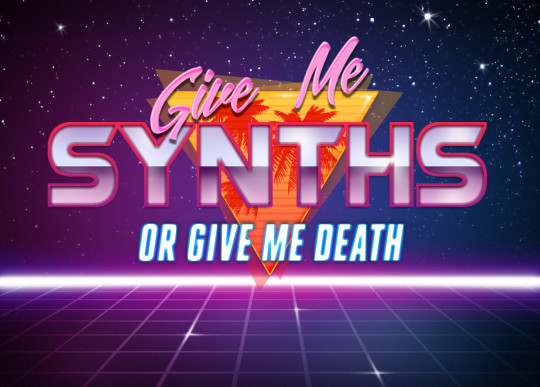
IT'S TIME
(again)
Pick a song from a bad description! You do not have to recognize the song to choose it (although, tbh, at least one of these should be instantly recognizable to the new wavers). Go with what is funniest or what sparks curiosity or just makes you feel some type of a way. Go with your gut.
At the end of the week, I will take all the songs and put them into a playlist, from the song with the least votes to the song with the most votes. If you would like to listen to the playlist when I'm done, and don't feel like finding the post again, please leave a comment or put it in the tags, and I'll tag you when the playlist is up. If you really can't wait a week to find out just what that mix of cumbia and Sandstorm is all about, shoot me an ask and I'll answer.
And please reblog! I like sharing the cool music I find with other people because I am extremely enthusiastic about it! But if you guys don't reblog, it's very difficult for me to find people to share things with. So if you have buddies who live for the synth, please reblog and have them see the poll.
(Also, there will probably be an expanded version of the playlist that comes out around the same time, because it was the only way I could a) cut songs off the original list and b) stop myself continuing down the rabbit hole of finding more music to actually do the poll. So it'll be like, twice the synths at least.)
(Also also, every song is a legit banger, so you will want that playlist, I'm just saying.)

#polls#music#playlists#synth music#honestly as a cure fan i kind of appreciate 'plainsong' being the first on the playlist even if it means it got the least votes#they just opened shows with it for so long you know?#anyway have fun enjoy listen to some new music today#Spotify
179 notes
·
View notes
Text
By E. Tammy Kim
Last fall, when I was living in South Korea, a woman in Seoul was killed by her stalker, a co-worker, in the bathroom of a subway station. A friend and I went to see an informal memorial dedicated to the victim. We read piles of notes left by strangers: “Stop femicide.” “Your death is my death.” “The government, the courts, our culture of discrimination are guilty of murder.” The scene of the crime and the shape of the commemoration recalled another murder, from 2016, which had sparked Korea’s version of the #MeToo movement. Whatever remained of that feminist upsurge now felt eclipsed by widespread backlash; in 2022, a new President had been elected on a platform of unreserved misogyny. I went from the memorial to a bookstore and bought Kim Hyesoon’s most recent poetry collection, “After Earth Dies, Who Will Moon Orbit?,” which was inspired by her mother’s passing. “Mom, don’t read this book. It’s all sand,” the dedication says. The poems include bloody dramas, familial and cosmic, set in the space of the kitchen. It felt appropriate to read Kim in that moment, not as a manual for processing grief but as an extended fantasia of feminine rage.
Kim is sixty-seven years old and going on her fifth decade as a poet in the public eye. She has published more than a dozen books—of poetry and of unclassifiable texts, with titles such as “I Do Woman Animal Asia”—and won every major literary award in South Korea. Since her début, in 1979, in Literature & Intellect, a journal founded during the country’s authoritarian period, she has been at the frothy crest of many artistic and political waves. In her first career, as an editor under the dictator Park Chung-hee, she had to tell a Marxist economist, on his deathbed, that his book had not survived the censors’ redactions and would not be published. (She later wrote, “Behind his thin, wrinkly glasses, his tears flowed down to his ears.”) In the mid-eighties, she joined Another Culture, a pioneering feminist group that convened educational camps for kids, critiqued patriarchal norms in books such as “Equal Parents, Free Children,” and translated women from other countries, including the Indonesian poet Sugiarti Siswadi. “We were finding a Korean language for feminism,” Kim told me. In her second career, as a professor at the Seoul Institute of the Arts, she helped revive an interest in shamanism and other gynocentric folk traditions. Once, she followed an anthropologist friend to Mt. Halla, on Jeju Island, to commemorate a shaman’s death in a days-long kut ritual of singing and ecstatic dancing.
Poetry in Korea has been a vaunted form—and traditionally left to men. Kim broke away from the masculine styles that came before her, which tended to be either self-consciously political or “pure” and detached from the world. She smashed words together and savagely enjambed her lines. She ripped apart syllable blocks and turned the letters of Hangul into raw material for typographic play: “Mrsdustingarmselephantgod. Salivadropexplodeslikefreongas. / . . . Do you know all the dearest gods that are hanging onto our limbs?” She wrote about women’s bodies, in all their guts and gore. “Women poets start out writing like men,” Kim told me. “Feminism isn’t something you’re born believing. Feminism is going through life and changing yourself.” In “To Write as a Woman: Lover, Patient, Poet, and You,” a book of essays, Kim connects the experience of the woman poet to Princess Bari, a Korean folk heroine who remains loyal to her parents even after they’ve abandoned her. To be lost or left behind, or to disappear, is at the core of being a female artist, Kim argues. In Korea, the book became something like Hélène Cixous’s “The Laugh of the Medusa” or a less practical version of Virginia Woolf’s “A Room of One’s Own.” It was reissued last year, on its twentieth anniversary, and is being translated into English.
Kim has pursued a vernacular that’s intensely Korean yet open to the world. She reads widely in translation, and hosts obscure Catholic nuns, the Tibetan sages, Adrienne Rich, Sylvia Plath, Simone de Beauvoir, and Agnès Varda in the back of her head. About fifteen years ago, when her own work began to be translated, she attracted a following across North America and Europe. She grew especially close to her English translator, the MacArthur-award-winning poet Don Mee Choi. In 2019, the English version of Kim’s “Autobiography of Death” won the international Griffin Poetry Prize. The book is structured as a forty-nine-day Buddhist mourning ceremony for hundreds of teen-agers who drowned when a Korean ferry capsized five years earlier: “perhaps a doll, perhaps a human, perhaps you, perhaps me,” she writes on day forty-four. Kim’s latest translated work, “Phantom Pain Wings,” came out in May. These two volumes are the first and second of what Kim calls her “death trilogy.” (The book I bought in Seoul, “After Earth Dies, Who Will Moon Orbit?,” is the final installment.) “I don’t think I’ve ever comforted anyone with my writing,” Kim notes in an afterword to “Phantom Pain Wings.” “Perhaps literature crosses into a zone where consolation can’t intervene.”
What zone does Kim occupy? She has modelled an approach to language, and the writing life, for dozens of poets and other artists in Korea and in the diaspora. In 2019, her writing on Princess Bari inspired “Community of Parting,” a video installation by Jane Jin Kaisen, a Danish Korean adoptee who represented the Korean pavilion at the Venice Biennale. (A suite of poems titled “Community of Parting” is the centerpiece of “Phantom Pain Wings.”) A former student of Kim’s, Yoo Heekyoung, runs a poetry bookshop called Wit N Cynical, in Seoul’s Hyehwa district, which became a center of the #MeToo protests. When that movement got started, Yoo told a reporter that Kim’s “Autobiography of Death” was a top seller.
Since retiring from her job as a professor, in early 2021, Kim has kept mostly to her apartment, in Seoul’s Daehakro neighborhood, beset by undiagnosed nerve pain—which she interprets as a chronic female ailment—and insomnia. At night, she goes between her bedroom and her study, lying down and failing to sleep. She reads old novels all the way through (recently, she was back on Clarice Lispector, a favorite) and new fiction until it bores her (“It isn’t very good”). She watches competitive-singing shows on television, answers e-mails from three continents, and drafts stanzas longhand.
Several times last year, I caught up with her in periods of good health. One afternoon, she intercepted me at a subway stop near her home. She lives with her husband, the avant-garde playwright Lee Kang-baek, and their daughter, Fi Jae Lee, whose raucous line drawings and sculptures adorn many of Kim’s books. Kim was unmistakable, even in a face mask: jet-black, bowl-cut hair, architectural glasses, scarf, billowy pants, and platform sneakers. We were repeat patrons of Gupo Noodle, an old-fashioned restaurant that specializes in batter-fried squid and rice noodles in anchovy broth. We ordered makgeolli rice wine, which she barely touched and I ended up drinking alone. Kim speaks at an unhurried pace, and in a soft rasp. She told a tragicomic story about travelling with an incurable melancholic, a Debbie Downer-type who saw only pebbles, never pearls. Laughing and eating with Kim, I felt an alien-like attentiveness to my own body. I considered the peristalsis working noodles down my throat and the purple-blue blood racing back to my heart. “My bones are hollow like a flute / so every one of them can sing and whistle.” “The achy root has spread between the intestines like lightning.” I suspected that she noticed all this somatic activity in herself and, possibly, in me.
For Kim, poetry is “dancing,” “being a nameless animal,” “crossing the river of the grotesque,” “making a revolution in the realm of language,” and “a verb.” She has long concerned herself with animals, human and nonhuman. The collection “Poor Love Machine” is filled with rats and felines. “Sorrowtoothpaste Mirrorcream” contains a gray bear, fire ants, roe deer, an ostrich, a rabbit, and a duck. Her pig poems are among her most famous, and controversial:
This poem, “I’m OK, I’m Pig!” appeared in her 2016 collection, “Bloom, Pig!” The following year, the book won the 5.18 Literature Award, named after the Gwangju uprising of May, 1980, when South Korean soldiers, commanded by President Chun Doo-hwan and backed by the U.S., killed democracy activists. On Facebook, male critics slammed Kim as undeserving of the honor: her use of “surrealism” and visceral animal metaphors were an insult to the democracy movement, they said. It seemed like a clear case of jealousy, or gendered territoriality—but Kim was forced to turn down the prize and a much-needed cash award. Her brute-force poetry—what one critic called “the female grotesque”—was at once career-making and costly. To my ears, in English, it recalls the work of Lyn Hejinian (“The baby is scrubbed everywhere, he is an apple.”) and Dawn Lundy Martin (“Awareness of being in a female body is a tinge of regret.”).
Kim’s new translated work, “Phantom Pain Wings,” is heavy with birds and verbs. “It’s an I-do-bird sequence,” Kim writes. As the second book in her death trilogy, it responds to the loss of her father and the traumas of his generation: colonization, war, and economic development at all costs. “Daddy, in the room where you died / I become bird,” she writes. The address sounds tame in English; in the hierarchical ordering of Korean, it’s a crass impossibility. “In Korea, you can’t call your father ‘you’ or ‘other,’ but, in this book, I call my father ‘daddy’ and ‘you,’ ” she told me. “It’s my way of bringing myself and other women to an equal level with the father as an institution, mechanism, and authority.” Kim envisions this rebellion as a bird flapping its wings in flight.
Translation has a peculiar capacity to reframe an artist’s œuvre: an old work becomes new in another language and time. “Phantom Pain Wings” was published in Korea, in 2019; its English version took shape during the pandemic. I visited Kim’s translator, Choi, in 2021, at her home in north Seattle. Her desk was taken up by a large computer monitor (for working in two languages, side by side) and thick Korean and English dictionaries. I pictured her sitting there, bird-watching through the window, as she mastered Kim’s ornithology. Choi kept a diary, which serves as a translator’s note at the back of the finished book:
Choi told me, “Not only was this book difficult to translate but I felt a great deal of grief myself while translating. It’s not only about her father. In that long poem, ‘Community of Parting,’ she’s also addressing the source of her sorrow, and it goes all the way back to the Korean War.” A twentieth-century war, a twenty-first-century pandemic—overlapping eras of mass death. There’s also a poem eerily relevant to post-Roe America called “Abortion Boat.” It features Varda’s film “One Sings, the Other Doesn’t,” from 1977, about two friends in France who must travel abroad—one to Switzerland, and one to Amsterdam—to get abortions. The speaker of the poem is in, or next to, a tunnel—the Dutch canals, the birth canal, and the tubular branches of a tree:
As I run, the tunnel runs beside me like a dog The tunnel cries and follows me, becoming very long The woman who just had an abortion but still has a baby runs When she exits the tunnel, her baby comes out but when she enters the tunnel her baby sticks to her again
Kim has described her process with Choi as one of exchange. “I don’t edit her translations,” Kim told me. “I answer her questions. Translating poetry is the hardest thing in the world.” For “Phantom Pain Wings,” Choi asked more than usual about subjects and objects. The syntax of Hangul leaves much unsaid: subjects are implied; pronouns are rare. (Verbs, though, especially in Kim, are abundant.) Choi’s inferences weren’t enough. Who was doing the thing, and to whom was the thing being done?
Kim did not always have an answer to Choi’s probing questions. She had to think, and decide, before writing back. The English version became more than an update of the Korean original: it was its own, new thing.
Kim’s responses sometimes created new problems. How to lasso multiple perspectives, and subjectivities, into a single term? In Korean, she could get away with ambiguity, but, in English, the doer had to be named. For a couple of poems, Choi told me, the fix was an equation. In “Girl, Your Body Has So Many Holes for Straws,” the subject is “I + bird + music”; its actions include speaking, vomiting, and lying “prostrate like a corpse, hiding at the bottom of a lake.” In “Straitjacket,” parentheses achieve the same clarification. “Why does apple (I) need to apologize to apple (you)? / Apple (you) and apple (I) are apologies (for what)?” These markings echo the playful, mathematical vocabulary of the Korean modernist poet Yi Sang, also known as Kim Haekyeong, whom Kim adores and pays tribute to in the book. One poem is titled “Again, I Need to Ask Poor Yi Sang.” In another, Yi’s pathbreaking “Crow’s Eye View” becomes “Crow’s Eye View 31”:
13 birds keep flying up till they can’t be seen from below . . . I want to keep writing ruthlessly about all 13 birds but that wouldn’t be polite, for they’ve been endlessly patient and it wouldn’t be polite to Kim Haekyeong either who wrote the same line— . . .
I don’t understand what these phrases specifically mean. (It’s reassuring that Kim occasionally had to mull her own intentions.) But they have an additive effect.
There is no thematic break or stylistic rupture in Kim’s poetry, despite the length of her career. The kitchen remains bloody and agonistic, demanding the preparation of yet another family meal. Knives and carcasses and dark orifices exist in otherworldly spaces. “Moon is shining like the lens of the patient’s eyeball / and I’m sitting on the white of his eye / examining his sadness,” she writes. Objects are extruded and sheathed. “A pair of fish-bone-shoes you can slip onto bare feet.” “Spiky sprouts burrow through your teary eyes.” Animals, real and mythological, fit inside one another, like turducken: “A rat / devours a sleeping white rabbit . . . . A rat devours a piglet that has fallen into a pot of porridge.” She captures the anger I detected in Seoul, which every woman has learned to gulp down. We are better off than we were when Kim started to write, no doubt. Yet we are still that rabbit, that punctured foot, that floating object compelled to reproduce.
One day, Kim and I rode a “village bus” (the rickety public equivalent of a hyper-local dollar van) up a steep incline to Gilsangsa, a Buddhist temple in Seoul. Gilsangsa is small and new and used to be a barbecue restaurant before coming to house an order of robed vegetarians. Kim and I walked the verdant grounds. We admired the low walls of ceramic tile and clay and circled a seven-tiered stone pagoda. Rain arrived, first in droplets, then in blocks, overwhelming our umbrellas. As we scampered downhill in muddy shoes, we were splashed by luxury S.U.V.s pulling up to gated houses. (The area has long been home to chaebol executives and retired authoritarians.) My Korean became more tentative in the din of the storm. “I like your accent and the mistakes you make. You sometimes use the wrong word,” she once told me. I was mortified, but convinced myself that it was actually a compliment—a poet taking pleasure in the jagged accidents of language.
We last hung out in late September, when she and Choi did a reading at the Seoul International Writers’ Festival. Kim spoke into a microphone as Choi’s translations were blown up on a pink-tinted screen behind her. The poet Kim Haengsook and several friends from the publishing world were there, as were Kim Hyesoon’s daughter and Choi’s husband. All but two of us were women. During Korea’s #MeToo movement, “there were so many accusations made and so many men who disappeared,” Kim had told me, that “when you open a literary magazine today, everyone’s a woman. Even the novelists.” This felt very true. The writers winning awards, getting buzz, and getting translated were mostly women, and often quite young—a second generation influenced by Kim. I thought of Lee Soho, whose raw début, “Catcalling,” was published in English, in 2021. I could imagine Kim dispensing the advice that appears in one of Lee’s poems: “You know I read a lot of debut collections these days. Listen, being a poet means going crazy. . . . Kill all your literary heroes and jump over our dead bodies. . . . hang on the edge of poetry. Then take another step forward from there.”
Our post-festival group walked to a Japanese restaurant for dinner. We sat at a row of tables along a linguistic gradient: the native Korean speakers on one end, then Kim’s daughter and Choi and me, then those who were English-only. We clinked tiny cups of sake and shared donburi bowls of silken eggs, braised meat, and seafood over rice. Kim was the doyenne of the festival, the mother of our feminine chatter. I remembered an old poem of hers, “The Story in Which I Appear as All the Characters 3.” The speaker of the poem is a forty-year-old woman, a child not yet born, and an old woman—all of them Kim. The poem ends:
We are stacked like three spoons On top of a pillow we turn our faces together The forty-year-old-me in the middle grinds her teeth saying, I’m scared I’m scared
0 notes
Photo

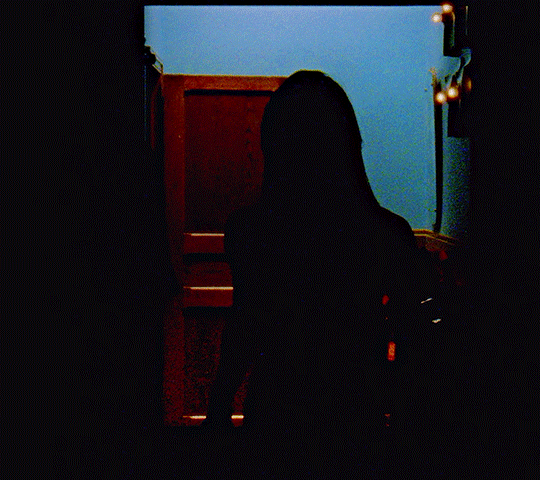



The Strange Color of Your Body's Tears (2013) Directed by Hélène Cattet and Bruno Forzani
#horroredit#filmedit#gifs#the strange color of your body's tears#l'étrange couleur des larmes de ton corps#hélène cattet#bruno forzani#my gifs#tscoybt*#2010s#blood#gore tw#flashing gifs
100 notes
·
View notes
Photo



Amer (2009) dir. Hélène Cattet & Bruno Forzani
#amer#helene cattet#hélène cattet#bruno forzani#knife tw#gore tw#horror#horror movies#cinema#rb#movies
47 notes
·
View notes
Note
Do we think Villanelle will have a redemption arc in s4?😬

A redemption arc for Villanelle sounds like an extraordinary bad idea.
She doesn't need one and shouldn't want one either. Villanelle is not entirely a villain, but she's far from hero material. Redemption arcs are for characters who want to change from doing bad things to doing good things. That's not her. Telling Dasha she doesn't want to do her job anymore and telling Carolyn she doesn't want to carry out assassinations for MI6 or The Twelve is not the same as Villanelle working in a homeless shelter and serving meals. When she whispers, "I've killed so many people, Eve," it's not an apology, but an admission of fact. She's got the body count to back up that she's kind of a big deal in the assassination business.

What has made Villanelle so charmingly chilling is how easily she embodies the idea of evil wearing a pretty face. Few could dismiss how alluring Villanelle is despite the fact she never weaponizes her sexuality. Seducing, then slaughtering some sucker between the sheets is left to James Bond bad girls. Villanelle has scruples and standards to maintain.
But she's coming off a bit of a losing streak where most of her kills in Season 3 were lacking in style, wit, as well as effectiveness. Strangling middle-aged widows is basic shit. So is knocking shopkeepers off ladders and then bludgeoning them to death. The piano tuning fork kills were laughably ludicrous. Not to say you couldn't kill two adult women with a perfectly thrown instrument, but to that degree of lethality? It seems a bit...exaggerated. Villanelle doesn't need redemption. She needs a reset. In Killing Eve's final season the solution is not to go "cold turkey" and stop murdering. Instead, Villanelle needs to think bigger and start taking out The Twelve. Now when she's most underestimated by her enemies (Hi, Hélène!) is the moment where she can not only be at her most dangerous, but backed up with a partner-in-crime eager to assist her in doing this good work (guess who?).
The last thought to go through Rhian's brain before the wheels of the train did was, "She's still got it. She can still kill."

Rhian came by that knowledge a little too late to do any good. Poke the bear and the bear pokes back. After that? You're dead. Then there's the Eve Factor. Villanelle may not want to kill, but she certainly doesn't want to die. Self-preservation is very much a primal instinct she possess in abundance. So is her instinct to protect her chosen mate: Eve Polastri. The only human being in the world she cares for. Villanelle would wade through a human mountain of blood and gore and bleeding bodies to save Eve.
Now, throw in Eve's own rapidly developing savagery which she seems very uninterested in putting on a leash. Quite the contrary. Eve's monster thrills her as much as it frightens her and she sees in Villanelle a kindred spirit who has found a way to control her more violent impulses, but not eliminate them entirely.
Eve wants to learn how to do that too and the second best thing that could happen for their last ride is Villanelle shows her how to tame that tiger until she chooses to let it loose (the first best thing would be Villaneve Sex, but you knew that, right?). Villanelle doesn't need redemption, doesn't deserve redemption and shouldn't even want redemption. Being this bad feels so good and who's badder than Villanelle? What would you have her be if she wasn't filled with gloriously evil purpose? Normal?
I shudder to think what a "normal" Villanelle would look like, but boring as hell instantly comes to mind.

#Killing Eve#Villanelle#oksana astankova#polite assassin#ke s4#redemption arc#no thank you#eve polastri#otp: my monster encourages your monster#but i like it#you're evil#it's hot#anonymous asks
335 notes
·
View notes
Text
New Horror 2022 - Day 31
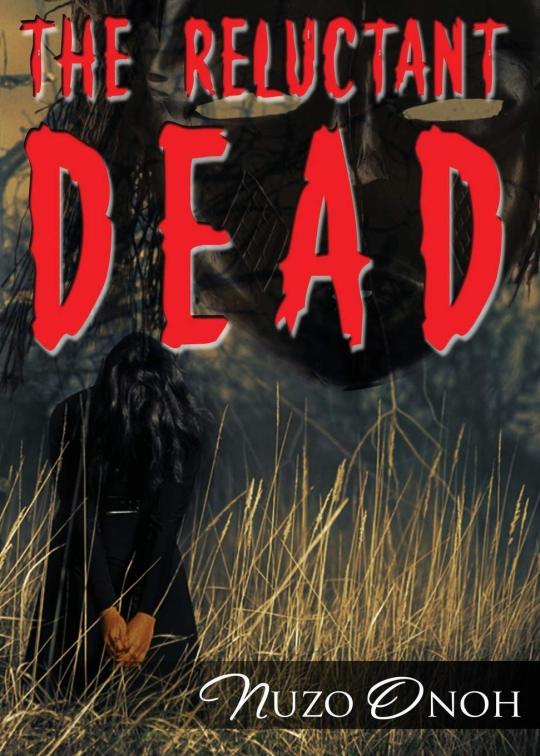
"A Good Student" by Nuzo Onoh (2014) "Bit by slow bit, his body started to disintegrate like fluffy flakes of white cotton."
I read a story from this book every year, and they are always memorable. Onoh’s stories present such a unique cultural viewpoint that it provides new takes on stories of spirits and ghouls. Another reminder to get my head out of America’s and Western Europe’s ass.
===

Dracula Daily - "October" by Bram Stoker & ed. Matt Kirkland (1897, 2021) “The men were scared every time we turned our electric lamp on them, and fell on their knees and prayed.”
I’ve been reading Dracula Daily, well, daily since the beginning, and it ends next month. What a journey. I’d never read it before so I’ve definitely not had the typical reading experience. All the travel stuff this month reminds me most of playing the Fury of Dracula board game, zipping around Europe to hunt down the children of the night. As far as the reading, October was the most suspenseful month thus far as the protagonists chased Dracula out of London and pursued him into the east, then are forced to wait and see where he’ll turn up. I’m not actually sure how this is going to end since the 1992 movie adaptation has been all I knew about Dracula proper for a long time and it turns out is not too faithful to the actual novel written by Bram Stoker. And I suppose neither is this chronological reading, but at least this gets through the original text.
===
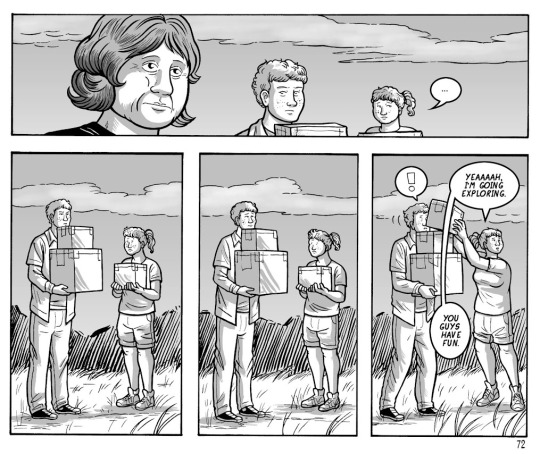
"The End of All Things" by Natalie Leif & Elaine Well (2014) "I'll look at the lines myself."
I wasn’t quite sure of the message here, and it’s probably a sign of a good story that I found it very compelling but wanted more. The ending evokes a sense of inevitable collapse beneath the weight of the world, that we are all inextricably linked to an entity we cannot escape.
===
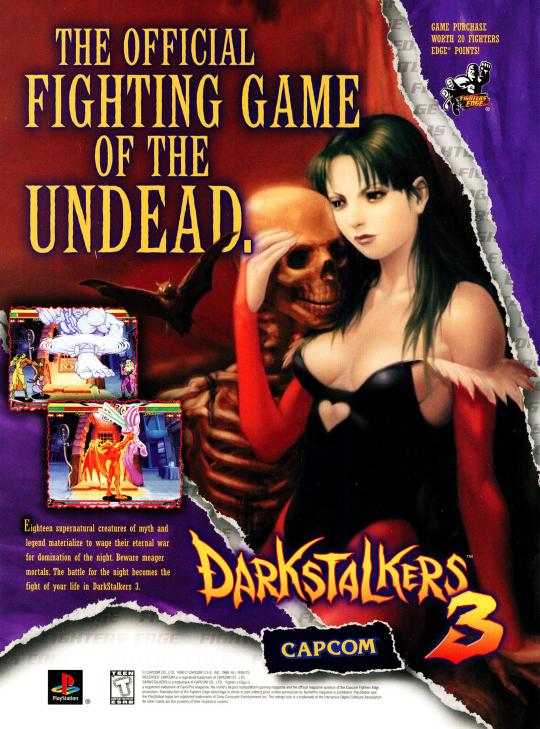
Darkstalkers 3 (aka Vampire Savior) dev. Capcom (1997) "Let's stick together until I'm full, shall we?”
Take Street Fighter and throw in supernatural and sci-fi horror figures, and that’s this game. Each of the 18 characters gets their own little arc and ending through the arcade mode, and while I’m sure most people are more interested in the multiplayer aspect, I always found the single player mode an interesting part of these fighting games. This is another instance in which I realize that while I never considered myself a horror fan when I was younger, I was absolutely in for monsters and the supernatural.
===
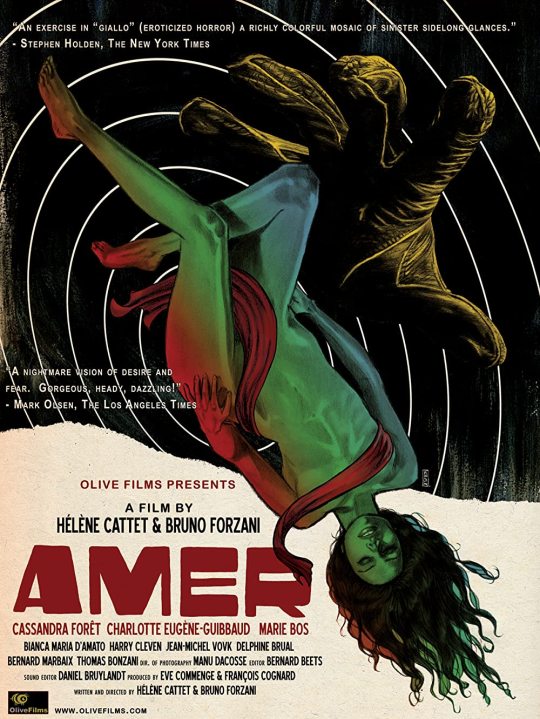
Amer dir. Hélène Cattet & Bruno Forzani (2009) "Can’t you see she’s hungry?”
This was a doozy and a strange movie to end the month. Hardly any dialogue and fairly interpretive, it’s also a sharp homage to giallo horror, which I’m not especially versed in. But part of the reason I take on these movie-a-day projects is to check out new works and be challenged, so I’m glad I did. The horror here is in confronting the self, staring inward into the abyss from which there is no escape.
===
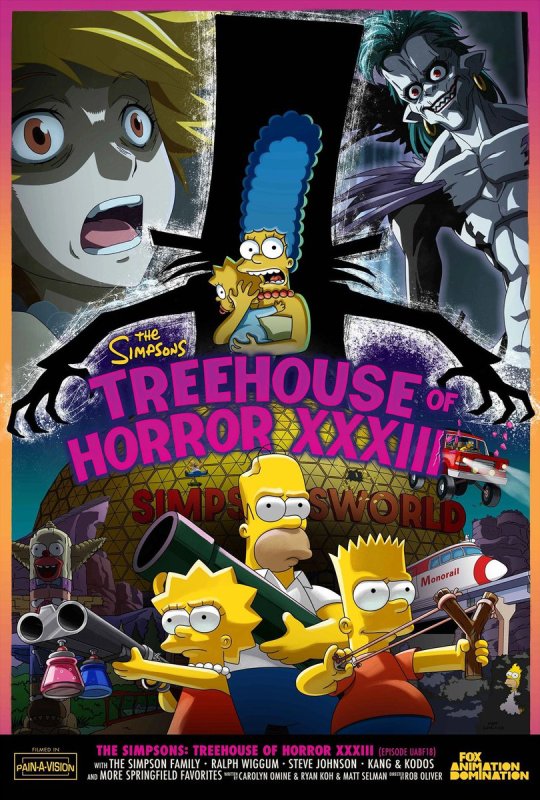
The Simpsons - "Treehouse of Horror XXXIII" (2022) "If we want to escape with our delusions of being alive, we have to fight.”
I enjoyed this year’s Treehouse of Horror, even if it was fairly light on comedy. But the comedy in recent years can sometimes be full of some real groaners, so perhaps I just welcome an acceptance by the writers that jokes every other second isn’t their strong suit. The first two segments are straightforward retellings of The Babadook and Death Note (the latter also animated in anime style), but the third segment was especially meta and weird, even as a simple parody of Westworld. That clicked with me because it’s as meta as The Simpsons Game, which I’ve written about before from my perspective of working on the game. That introspective angle also makes it the darkest segment, asking the audience to examine pop culture today and the way we treat the characters in our favorite media.
===
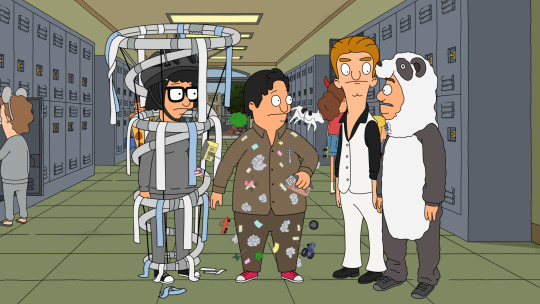
Bob's Burgers - "Apple Gore-chard! (But Not Gory)" (2022) "Everyone wants a piece of you. Sometimes as a sacrifice to the gods.”
This show’s dedication to producing a Halloween show every year is admirable. The episodes are always great, though in recent years they’ve moved away from Halloween itself as the central theme in favor of other spooky familial shenanigans. Louise’s exploration of the nature of popularity was a poignant thread.
===
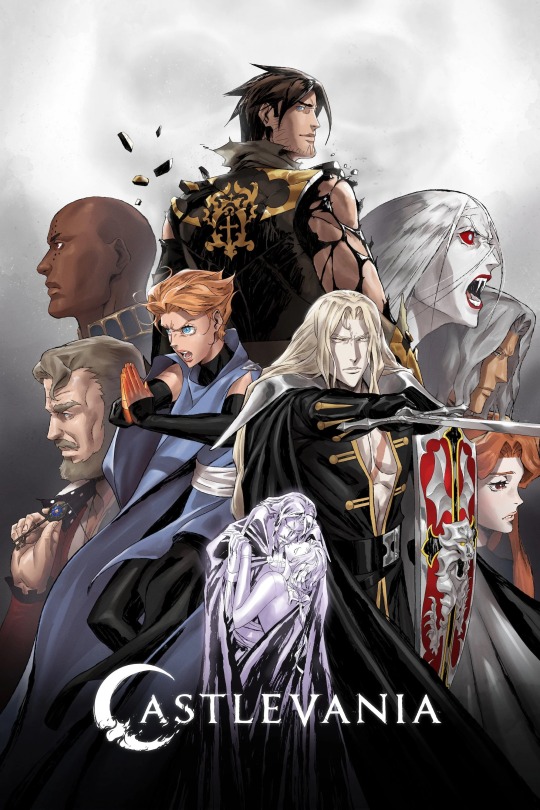
Castlevania - Seasons 3 & 4 (2020-2021) “Thank you for my second life. I intend to use it well and make wonderful new dreams of it.“
I’d watched the first two seasons some time ago, and waited until the show was complete to catch the rest. While the arc of the first two seasons that were focused on Dracula felt complete, these latter two seasons were more of an extended epilogue, exploring these characters in the wake of defeating a great foe. As a result, there isn’t the same satisfying arc, just a series of interesting encounters and meditations on forming new lives and relationships. It feels like a short story anthology that follows the novel. Reflecting on it, I’d say it’s just the thing to round out the month, some breathy autumnal monologues punctuated by decadent battle sequences.
#castlevania#the simpsons#treehouse of horror#bob's burgers#halloween#television#amer#Hélène Cattet#Bruno Forzani#movies#darkstalkers#vampire savior#capcom#video games#Natalie Leif#Elaine Well#then it was dark#comics#nuzo onoh#the reluctant dead#short stories#horror#new horror 2022#horror fiction#dracula daily
2 notes
·
View notes
Text
Indigenous Inspirations: The Kaba dress
Presenting a new series, ‘Indigenous Inspirations’ where we explore the rich sartorial traditions and textile art forms of diverse countries and cultures.
In the wake of the current global scenario, it is important,more than ever, to promote and reclaim the power back to cultures that deserve to be preserved and appreciated, to bring the spotlight back to the richness and beauty of these cultures, including their clothing history.
Keeping that in mind, In the first edition of Indigenous Inspirations, We take a look at the Kaba, a beautiful dress worn by the women of Cameroon, In Central Africa.
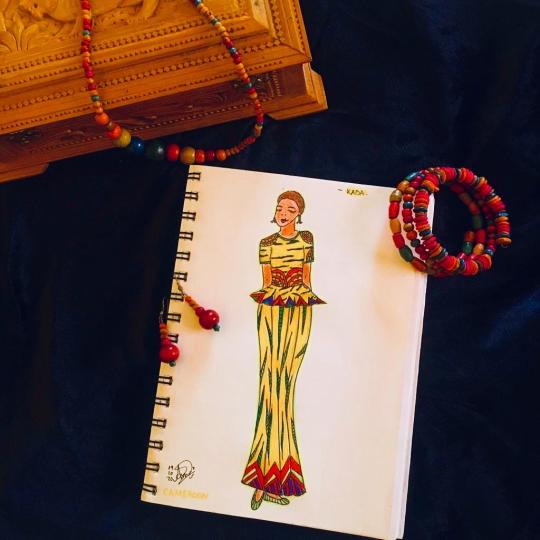
Above: An artistic rendition of a modern interpretation of Kaba partly based on the writer’s memory
I have a personal story associated with how I first came across this beautiful garment. Noticing an exchange student walk past in a beautiful and colorful garment i didn’t know the name of, It was also the silhouette, which looking at from afar, consisted of a gored skirt and (If I recollect correctly) A top reminscent of a peplum silhouette. Being a fashion student at the time, I walked up to her and complimented her on her beautiful traditional dress and asked her about the same. “It’s called a Kaba”, She said, and up close, the combination of the colors yellow, red, blue, green, seemed to match perfectly with her beautiful and smooth ebony skin, accessorised with simple, colorful beaded earrings.
A quick google search after this conversation on ‘ Kaba’ and ‘Cameroon’ provided with very little written information, but a substancial amount of Caba images, consisting of various silhouettes and prints.
Here is a compilation of those pictures and some information on the beautiful garment, that is the Kaba.
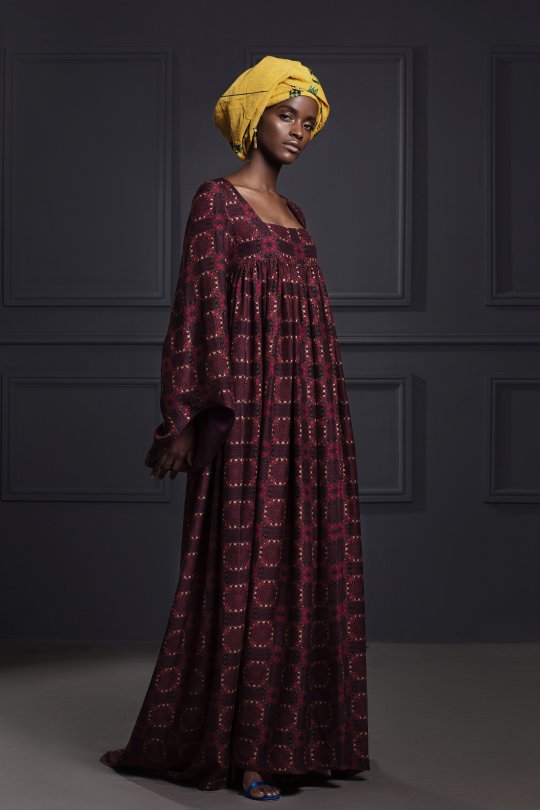
The Kaba, is a maxi dress with a yoke, extending from above the bust, worn by the Sawa women of Cameroon. While the authentic kaba is usually a maxi dress, most women tend to call any loose fitted dress sewn with Batik or Wax visco fabric as a Kaba.
The Kaba is thought to have been created by Hélène Saker, the wife of missionary Alfred Saker, to ‘ cover the naked bodies of her husband’s servants, and make them presentable before God and missionaries, such as her husband.’
Certain sources, however, seem to claim that the Kaba is purely of Cameroonian conception and origin.
Regardless, According to Cameroon Gallery, the Kaba created by Hélène had no glamour or beauty, and resembled a ‘large bag’ consisting of 4 openings: 2 sleeves, and one opening each for the head and feet.
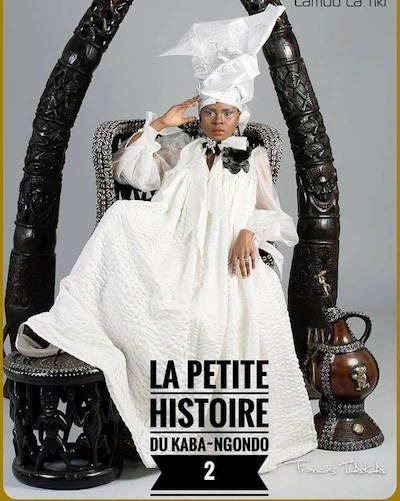
As the Kaba spread beyond the maid-servants and into the daily wardrobe of the women, It underwent many transformations, and the Kaba came to represent the history and culture of the women of the coast of Cameroon, and has also become the outift of choice for the Sawa women during the festival of Ngondo.
The Kaba finds relevance in the present day as the honorary garment of some respected women, such as elders and high-class ladies.
Incorporating various eye-catching prints and stylish modern silhouettes, the modern-day Kaba seems to reflect the changing tastes of modern Cameroonian women, with google search suggestions such as ‘latest kaba styles 2020′.

The Kaba and slit silhouette, often worn in Ghana, consists of a blouse and a skirt.
Modern interpretations of Kaba also consist of innovative and eye-catching looks such as the one below.

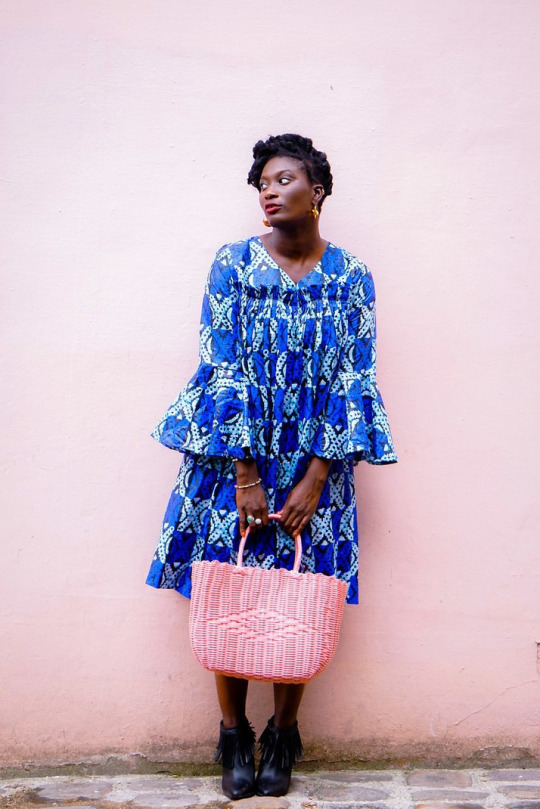
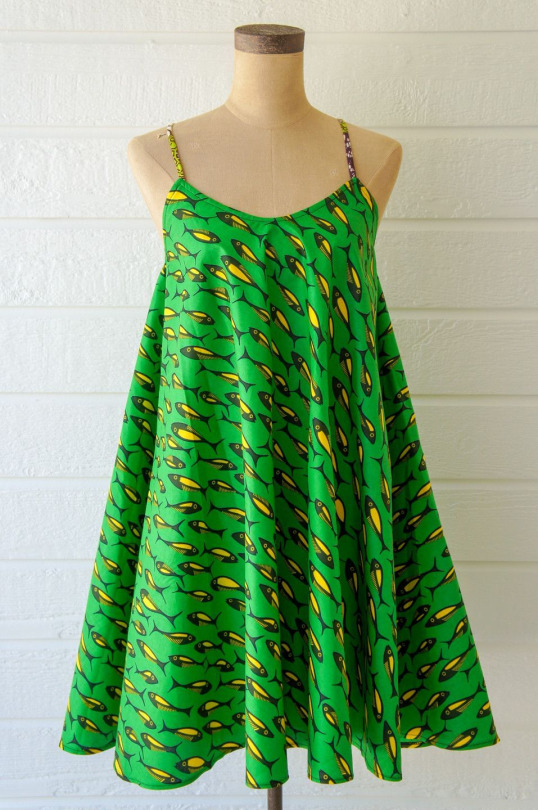
Modern day adaptations inspired by the Kaba into day to day dresses consisting of simple silhouettes, keeping intact the eye-catching prints and colors of the original can also be seen.
In recent times, the Kaba has also inspired young African fashion designers in their collections. One such collection, is ‘Ngondo’, a 2018 Resort Collection hy Maison D’Afie.
(You can read the original blogpost on the collection written by a Nigerian Fashion and lifestyle blog,here.)
The collection,Ngondo, draws inspiration from the Kaba, worn by the Cameroonian women in colonial times. The colors used in the collection also reflect the culture and lifestyle of the Sawa tribe, from where, Sarah Divine-Garba, the creative director of the brand hails from.
The collection re-interprets the style elements of traditional kaba into modern and elegant silhouettes, with numerous alterations to the original silhouette, using techniques such as pleats, and elaborate sleeve styles and rich yet subdued colors of green, and brown, with accents of colors such as yellow and pink, also incorporating prints reminscent of the original Kaba.

One thing that binds the traditional Kaba and it’s modern interpretations, is that it represents the aspirations and rich cultural heritage of the culture it hails from.
A garment that symbolises deep cultural meaning, the future of this beautiful garment,Kaba, seems bright and promising.
#fashioncrux#indigenousinspiration#africanfashion#kaba#cameroon#fashionhistory#fashion#fashionblog#fashionblogdaily#fashionblogstyle#fashionblogpost#fashionblogger#poc fashion#blacklivesmatter#styleinspiration#styleblogger#fashiondevelopment#fashiondesign#fashiondesigne#design history#culture
7 notes
·
View notes
Text
" les côtes du Tregor sont très gore "
P-L. Jelinek, 14 mai 2019

Ce 14 mai, 50 bornes sous le soleil et un rare vent d'Est dans la face... Le velo commence à faiblir... C'est dur mais c'est beau. Premières fraises de l'année à Plougasnou, les baies de Morlaix, St Jean du Doigt et arrivée sur celle de St Michel en Grèves et son cimetière marin.





On rencontre finalement Hélène au troquet du coin qui nous héberge avec Jean-Claude sur les hauteurs de la baie: le panorama de chez eux est unique. Un énorme merci pour leur accueil et pour les premières notion d'espéranto... Ankorau mil dankon

2 notes
·
View notes
Video
instagram
最近米其林公布了最新名單。 以下給有來倫敦的朋友作個參考, 姐只吃過2家, 實在失職, 等之後吃多一點再來給大家寫份用餐心得😋😋😋 🌟 🌟 🌟3 Michelin Star • Alain Ducasse at the Dorchester • Restaurant Gordon Ramsay • Sketch (The Lecture Room & Library) • CORE by Clare Smyth • Hélène Darroze at The Connaught 🌟 🌟 2 Michelin Star • Claude Bosi at Bibendum • La Dame de Pic • Dinner by Heston Blumenthal • Le Gavroche • Kitchen Table at Bubbledogs Da Terra • Story • Wong (Chinese Cusine) 🌟1 Michelin Star • Hakkasan in Tottenham Court Road • The Ninth in Goodge Street • Pied à Terre in Goodge Street • Dining Room at the Goring in Victoria • Barrafina in Soho • Ikoyi in St James’s Market • Quilon in St. James’s Park • Hide in Piccadilly • The Ritz in Green Park • Seven Park Place in Green Park • Gymkhana in Green Park • Amaya in Knightsbridge • Céleste in Hyde Park Corner • Marcus in Knightsbridge • Pétrus by Gordon Ramsay in Knightsbridge • Kai in Mayfair • Pollen Street Social in Oxford Circus • Hakkasan in Mayfair • Sabor in Mayfair • Umu in Mayfair • Veeraswamy in Mayfair • Murano in Mayfair • Locanda Locatelli in Marble Arch • Portland in Marylebone • Trishna in Marylebone • St. John in Clerkenwell • City Social in the City • Club Gascon in Barbican • Angler in Liverpool Street • The Clove Club in Shoreditch • Lyle’s in Shoreditch • Brat in Shoreditch • Leroy in Shoreditch • Galvin La Chapelle in Spitalfields • Mãos in Shoreditch • Elystan Street in Chelsea • Five Fields in Sloane Square • Harwood Arms in Fulham • River Café in Hammersmith • La Trompette in Chiswick • Kitchen W8 in Kensington • The Glasshouse in Kew • Endo at the Rotunda in White City • Trinity in Clapham • Chez Bruce in Wandsworth Common • Dysart Petersham in Richmond • Cornerstone in Hackney Wick • Behind in Hackney • Casa Fofō in Hackney • Benares in Mayfair • Davies and Brook in Mayfair • Muse in Belgravia • SO|LA in Soho https://www.instagram.com/p/CTesoYRgv6k/?utm_medium=tumblr
0 notes
Text
T’ES MORTE HÉLÈNE (Michiel Blanchart, 2020)
T’ES MORTE HÉLÈNE (Michiel Blanchart, 2020)
(Édition Spéciale Gérardmer 2021) 🟠 Ecrit et réalisé par Michiel Blanchart Maxime vit en couple avec le fantôme de sa petite amie, Hélène, mais cette situation est ingérable. Il décide d’aller de l’avant, rencontrer de nouvelles filles, et quitter Hélène mais elle va très mal le prendre. Basculant de la comédie presque romantique au gore, ce court-métrage belge est une vraie réussite par son…

View On WordPress
0 notes
Text
Film Independent Spirit Award Nominees Announced

ICYMI: The Film Independent Spirit Awards nominations were announced last week, with Eliza Hittman’s drama Never Rarely Sometimes Always leading with seven nominations. For the first time in Spirit Awards history, five new TV award categories were announced: Best New Scripted Series, Best New Non-Scripted or Documentary Series, Best Male Performance in a New Scripted Series, Best Female Performance in a New Scripted Series and Best Ensemble Cast in a New Scripted Series.
Winners, who are selected by Film Independent Members, will be announced at the Spirit Awards on Thursday, April 22. The awards ceremony is also changing this year from a live daytime event on a Saturday afternoon to prime time on Thursday, broadcast live exclusively on IFC at 10 pm ET / 7 pm PT.
FILM CATEGORIES
BEST FEATURE (Award given to the producer. Executive Producers are not awarded.)
First Cow Producers: Neil Kopp, Vincent Savino, Anish Savjani
Ma Rainey’s Black Bottom Producers: Todd Black, Denzel Washington, Dany Wolf
Minari Producers: Dede Gardner, Jeremy Kleiner, Christina Oh
Never Rarely Sometimes Always Producers: Sara Murphy, Adele Romanski
Nomadland Producers: Mollye Asher, Dan Janvey, Frances McDormand, Peter Spears, Chloé Zhao
BEST FIRST FEATURE (Award given to director and producer)
I Carry You With Me Director/Producer: Heidi Ewing Producers: Edher Campos, Mynette Louie, Gabriela Maire
The Forty-Year-Old Version Director/Producer: Radha Blank Producers: Inuka Bacote-Capiga, Jordan Fudge, Rishi Rajani, Jennifer Semler, Lena Waithe
Miss Juneteenth Director: Channing Godfrey Peoples Producers: Toby Halbrooks, Tim Headington, Jeanie Igoe, James M. Johnston, Theresa Steele Page, Neil Creque Williams
Nine Days Director: Edson Oda Producers: Jason Michael Berman, Mette-Marie Kongsved, Matthew Lindner, Laura Tunstall, Datari Turner
Sound of Metal Director: Darius Marder Producers: Bill Benz, Kathy Benz, Bert Hamelinck, Sacha Ben Harroche
JOHN CASSAVETES AWARD – Given to the best feature made for under $500,000 (Award given to the writer, director and producer. Executive Producers are not awarded.)
The Killing of Two Lovers Writer/Director/Producer: Robert Machoian Producers: Scott Christopherson, Clayne Crawford
La Leyenda Negra Writer/Director: Patricia Vidal Delgado Producers: Alicia Herder, Marcel Perez
Lingua Franca Writer/Director/Producer: Isabel Sandoval Producers: Darlene Catly Malimas, Jhett Tolentino, Carlo Velayo
Residue Writer/Director: Merawi Gerima
Saint Frances Director/Producer: Alex Thompson Writer: Kelly O’Sullivan Producers: James Choi, Pierce Cravens, Ian Keiser, Eddie Linker, Raphael Nash, Roger Welp
BEST DIRECTOR
Lee Isaac Chung Minari
Emerald Fennell Promising Young Woman
Eliza Hittman Never Rarely Sometimes Always
Kelly Reichardt First Cow
Chloé Zhao Nomadland
BEST SCREENPLAY
Lee Isaac Chung Minari
Emerald Fennell Promising Young Woman
Eliza Hittman Never Rarely Sometimes Always
Mike Makowsky Bad Education
Alice Wu The Half of It
BEST FIRST SCREENPLAY
Kitty Green The Assistant
Noah Hutton Lapsis
Channing Godfrey Peoples Miss Juneteenth
Andy Siara Palm Springs
James Sweeney Straight Up
BEST CINEMATOGRAPHY
Jay Keitel She Dies Tomorrow
Shabier Kirchner Bull
Michael Latham The Assistant
Hélène Louvart Never Rarely Sometimes Always
Joshua James Richards Nomadland
BEST EDITING
Andy Canny The Invisible Man
Scott Cummings Never Rarely Sometimes Always
Merawi Gerima Residue
Enat Sidi I Carry You With Me
Chloé Zhao Nomadland
BEST FEMALE LEAD
Nicole Beharie Miss Juneteenth
Viola Davis Ma Rainey’s Black Bottom
Sidney Flanigan Never Rarely Sometimes Always
Julia Garner The Assistant
Frances McDormand Nomadland
Carey Mulligan Promising Young Woman
BEST MALE LEAD
Riz Ahmed Sound of Metal
Chadwick Boseman Ma Rainey’s Black Bottom
Adarsh Gourav The White Tiger
Rob Morgan Bull
Steven Yeun Minari
BEST SUPPORTING FEMALE
Alexis Chikaeze Miss Juneteenth
Yeri Han Minari
Valerie Mahaffey French Exit
Talia Ryder Never Rarely Sometimes Always
Yuh-jung Youn Minari
BEST SUPPORTING MALE
Colman Domingo Ma Rainey’s Black Bottom
Orion Lee First Cow
Paul Raci Sound of Metal
Glynn Turman Ma Rainey’s Black Bottom
Benedict Wong Nine Days
ROBERT ALTMAN AWARD – Given to one film’s director, casting director and ensemble cast
One Night in Miami… Director: Regina King Casting Director: Kimberly R. Hardin Ensemble Cast: Kingsley Ben-Adir, Eli Goree, Aldis Hodge, Leslie Odom Jr.
BEST DOCUMENTARY (Award given to the director and producer)
Collective Director/Producer: Alexander Nanau Producers: Hanka Kastelicová, Bernard Michaux, Bianca Oana
Crip Camp Directors/Producers: Jim LeBrecht, Nicole Newnham Producer: Sara Bolder
Dick Johnson is Dead Director/Producer: Kirsten Johnson Producers: Katy Chevigny, Marilyn Ness
The Mole Agent Director: Maite Alberdi Producer: Marcela Santibáñez
Time Director/Producer: Garrett Bradley Producers: Lauren Domino, Kellen Quinn
BEST INTERNATIONAL FILM (Award given to the director)
Bacurau Brazil Directors: Juliano Dornelles, Kleber Mendonça Filho
The Disciple India Director: Chaitanya Tamhane
Night of the Kings Ivory Coast Director: Philippe Lacôte
Preparations to be Together for an Unknown Period of Time Hungary Director: Lili Horvát
Quo Vadis, Aida? Bosnia and Herzegovina Director: Jasmila Žbanić
PRODUCERS AWARD – The Producers Award, now in its 24th year, honors emerging producers who, despite highly limited resources, demonstrate the creativity, tenacity and vision required to produce quality independent films.
Kara Durrett
Lucas Joaquin
Gerry Kim
SOMEONE TO WATCH AWARD – The Someone to Watch Award, now in its 27th year, recognizes a talented filmmaker of singular vision who has not yet received appropriate recognition.
David Midell Director of The Killing of Kenneth Chamberlain
Ekwa Msangi Director of Farewell Amor
Annie Silverstein Director of Bull
TRUER THAN FICTION AWARD – The Truer Than Fiction Award, now in its 26th year, is presented to an emerging director of non-fiction features who has not yet received significant recognition.
Cecilia Aldarondo Director of Landfall
Elegance Bratton Director of Pier Kids
Elizabeth Lo Director of Stray
TELEVISON CATEGORIES
BEST NEW NON-SCRIPTED OR DOCUMENTARY SERIES (Award given to the Creator, Executive Producer, Co-Executive Producer)
Atlanta’s Missing and Murdered: The Lost Children Executive Producers: Jeff Dupre, Joshua Bennett, Sam Pollard, Maro Chermayeff, John Legend, Mike Jackson, Ty Stiklorius
City So Real Produced by: Zak Piper, Steve James Executive Producers: Jeff Skoll, Diane Weyermann, Alex Kotlowitz, Gordon Quinn, Betsy Steinberg, Jolene Pinder
Immigration Nation Executive Producers: Christina Clusiau, Shaul Schwarz, Dan Cogan, Jenny Raskin, Brandon Hill, Christian Thompson Co-Executive Producers: Andrey Alistratov, Jay Arthur Sterrenberg, Lauren Haber
Love Fraud Executive Producers: Rachel Grady, Heidi Ewing, Amy Goodman Kass, Vinnie Malhotra, Jihan Robinson, Michael Bloom, Maria Zuckerman
We’re Here Creators/Executive Producers: Stephen Warren, Johnnie Ingram Executive Producers: Eli Holzman, Aaron Saidman, Peter LoGreco Co-Executive Producers: Erin Haglund, Sabrina Mar
BEST NEW SCRIPTED SERIES (Award given to the Creator, Executive Producer, Co-Executive Producer)
I May Destroy You Creator/Executive Producer: Michaela Coel Executive Producers: Phil Clarke, Roberto Troni
Little America Executive Producers: Lee Eisenberg, Joshuah Bearman, Joshua Davis, Arthur Spector, Alan Yang, Siân Heder, Kumail Nanjiani, Emily V. Gordon
Small Axe Executive Producers: Tracey Scoffield, David Tanner, Steve McQueen
A Teacher Creator/Executive Producer: Hannah Fidell Executive Producers: Michael Costigan, Kate Mara, Louise Shore, Jason Bateman, Danny Brocklehurst Co-Executive Producer: Daniel Pipski
Unorthodox Creator/Executive Producer: Anna Winger Creator: Alexa Karolinski Executive Producer: Henning Kamm
BEST FEMALE PERFORMANCE IN A NEW SCRIPTED SERIES
Elle Fanning The Great
Shira Haas Unorthodox
Abby McEnany Work in Progress
Maitreyi Ramakrishnan Never Have I Ever
Jordan Kristine Seamón We Are Who We Are
BEST MALE PERFORMANCE IN A NEW SCRIPTED SERIES
Adam Ali Little America
Nicco Annan P-Valley
Conphidance Little America
Amit Rahav Unorthodox
Harold Torres ZeroZeroZero
BEST ENSEMBLE CAST IN A NEW SCRIPTED SERIES
I May Destroy You Ensemble Cast: Michaela Coel, Paapa Essiedu, Weruche Opia, Stephen Wight
0 notes
Text
get to know me!
tagged by: @tony-higgins
rules: tag ten of your followers and get to know them better.
name: hollis (holly/hollister/holl?? i dunno people have called me variations of it)
gender: non-binary B)
star sign: leo !!
height: 160 cm
sexuality: pansexual
what image do you have as your wallpaper?: my lock screen is an edit from the great comet with Hélène (Amber Grey) and Natasha (Denée Benton) and my home screen is an edit with Anatole (Lucas Steele)
have you ever had a crush on a teacher?: never, but one of my friends did and this dude was like,,,, 35
where do you see yourself in 20 years?: uhh i’m hoping i’ll be married and doing something in the arts <3
if you could be anywhere right now, where?: fuckin,,,, new york, isn’t it obvious?????
tw: gore mentions for next answer
what was your coolest halloween costume?: last year, i did a gorey makeup thing where it looked like i had a can jabbed into my face and honestly people were terrified and intrigued.
what was your favourite 90s show?: THE FRESH PRINCE OF BEL-AIR JEBSBS HIT ME UP AND WE’LL RAP THE ENTIRE INTRO
what was your last kiss?: uhhh,, i kissed my friend on her hand but lip-wise, i kissed one of my bi-curious friends who claimed she had feelings for me lmao
have you ever been to las vegas?: no?? but i dunno maybe i’ll go at some point in my life
favourite pair of shoes?: they’re these shoes that look like?? those archery boots. like they go up to my calf’s and they’re leather and just god i love them
favourite fruit: grapes and/or mangoes
favourite book: shit uhhh the outsiders probably??? but i wanna also include shakespeare’s stuff since that’s some good shit right there
stupidest thing you’ve ever done: i was doing some crafts once and i was using superglue. i noticed it was dripping so i was like “mmmm i’m just gonna wipe this with my bare fingers because that’s a good idea” and ended up supergluing my fingers together.
i’m sure i’ve done stupider but i can’t remember right now
i tag whoever sees this and wants to do it!! introduce yourselves and @ me so we can get to know each other B^)
#fun fact: superglue comes off fingers after a few days#i shit you not i read a story that said a kid only got his fingers unstuck by cutting between them#so you can imagine my panic#tagged#shut up hollis
5 notes
·
View notes